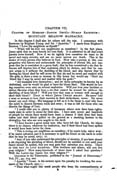
[p. 131]
CHAPTER VII.
CHAPTER OF HORRORS—DANITE DEVILS—HUMAN SACRIFICE—
MOUNTAIN MEADOW MASSACRE.
In this chapter I shall also let others tell the tale. I commence with Sermons by Brigham Young and his "Apostles." I quote from Brigham's Sermon "Love thy neighbour as thyself."
"When will we love our neighbours as ourselves? In the first place, Jesus saith that no man hateth his own flesh. It is admitted by all that every person loves himself. Now if we do rightly love ourselves we want to be saved and enjoy eternity and see no more sorrow nor death. This is the desire of every person who believes in God. Now take a person in this congregation who knows and understands the principles of eternal life, and suppose that he is overtaken in a gross fault, that he has committed a sin that he knows will deprive him of that exaltation which he desires, and that he cannot attain to it without the shedding of his blood, and also knows that by having his blood shed he will atone for that sin and be saved and exalted with the gods, is there a man or woman in this house but would say 'Shed my blood that I may be saved and exalted with the gods?'
"All mankind love themselves; and let those principles be known by an individual, and he would be glad to have his blood shed. This would be loving ourselves even unto an eternal exaltation. Will you love your brothers or sisters likewise when they have a sin that cannot be atoned for without the shedding of their blood? Will you love that man or woman well enough to shed their blood? THAT IS WHAT JESUS CHRIST MEANT. He never told a man or woman to love their enemies in their wickedness, never. He never meant any such thing; His language is left as it is for those to read who have the spirit to discern between truth and error; it was so left for those who can discern the things of God.
"I could refer you to plenty of instances where men have been righteously slain in order to atone for their sins. I have seen scores and hundreds of people for whom there would have been a chance if their lives had been taken and their blood spilled on the ground as a smoking incense to the Almighty, but who are now angels to the devil.
"I have known a great many men who have left this Church, for whom there is no chance whatever for exaltation, but if their blood had been spilled it would have been better for them.
"This is loving our neighbour as ourselves; if he needs help, HELP HIM; if he wants salvation and it is necessary to spill his blood on the earth in order that he may be saved, SPILL IT.
"Any of you who understand the principles of eternity, if you have sinned a sin requiring the shedding of blood, should not be satisfied or rest until your blood should be spilled, that you may gain that salvation you desire. THAT IS THE WAY TO LOVE MANKIND. Now brethren and sisters, will you live your religion? How many hundreds of times have I asked that question? Will the Latter-day Saints live their religion?"
Discourse in the Tabernacle, published in the "Journal of Discourses," Vol. IV., pp. 219, 220.
"Apostle" Grant, in his sermon upon the penalty for breaking the covenants of the Church, says:—
"Then what ought this meek people who keep the commandments of
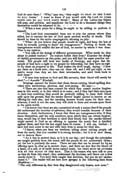
[p. 132]
God do unto them? 'Why,' says one, 'they ought TO PRAY TO THE LORD TO KILL THEM.' I want to know if you would wish the Lord TO COME DOWN AND DO ALL YOUR DIRTY WORK? Many of the Latter-day Saints will pray, and petition, and supplicate the Lord to do a thousand things they themselves would be ashamed to do. * * * *
"When a man prays for a thing, he ought to be willing to perform it himself.
"The Lord God commanded them not to pity the person whom they killed, but to execute the law of God upon persons worthy of death. This should be done by the entire congregation, showing no pity.
"What! do you believe that people would do right, and keep the law of God, by actually putting to death the transgressors? Putting to death the transgressors would exhibit the law of God, no matter by whom it was done. That is my opinion.
"You talk of the doings of different governments. What mode do they adopt to punish traitors? Do traitors forfeit their lives? Examine the doings of earthly governments on this point, and you will find the same practice universal. But people will look into books of theology, and argue that the people of God have a right to try people for fellowship, but they have no right to try them on property or life. That makes the devil laugh, saying: I have got them on a hook now; they can cut them off, and I will put eight or ten spirits worse than they are into their tabernacles, and send them back to mob them."
"If men turn traitors to God and His servants, their blood will surely be shed."—"Apostle" Kimball.
Brigham assured the Saints that these throat-cutting, blood-spilling doctrines were meritorious, glorious, and soul-saving. He says:—
"There are sins that men commit for which they cannot receive forgiveness in this world, or in that which is to come; and if they had their eyes open to their true condition, they would be perfectly willing to have their blood spilt upon the ground, that the smoke thereof might ascend to heaven as an offering for their sins, and the smoking incense would atone for their sins; whereas, if such is not the case, they will stick to them and remain upon them in the spirit-world.
"I do know that there are sins committed of such a nature that if the people did understand the doctrine of salvation, they would tremble because of their situation. And, furthermore, I know that there are transgressors who, if they knew themselves, and the only condition upon which they can obtain forgiveness, would beg of their brethren to shed their blood, that the smoke thereof might ascend to God as an offering to appease the wrath that is kindled against them, and that the law might have its course. I will say, further: I have had men come to me and offer their lives to atone for their sins.
"I know, when you hear my brethren telling about cutting people off from the earth, that you consider it is strong doctine; but it is to save them, not to destroy them.
"As it was in ancient days, so it is in our day; and though the principles are taught publicly from this stand, still the people do not understand them; yet the law is precisely the same. There are sins that can be atoned for by an offering upon an altar as in ancient days; and there are sins that the blood of a lamb, of a calf, or of turtle doves cannot remit, but THEY MUST BE ATONED FOR BY THE BLOOD OF THE MAN. That is the reason why men talk to you as they do from this stand; they understand the doctrine, and throw out a few words about it. You have been taught that doctrine, but you do not under-stand it." The reader will see here how apropos is the following lines from Hudibras—
"The only difference is, that then they slaughtered only beasts, now men."
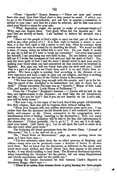
[p. 133]
"From "Apostle" Grants Sermon:—"There are men and women here who must have their blood shed or they cannot be saved. I advise you to go to the President immediately, and ask him to appoint a committee to attend to your case; and then let a place be selected, and let that committee shed your blood to atone for your sins.
"What disposition ought the people to make of covenant-breakers? Why, says one, forgive them. Very good, What did the Apostle say? He says they are worthy of death. I am inclined to believe his decision was a just one.
"Have not the people of God a right to carry out that part of the law as well as any other portion of it? It is their right to baptize a sinner to save him, it is also their right to kill a sinner to save him, when he commits those crimes that can only be atoned for by shedding his blood. We would not kill a man, of course, unless we killed him to save him. Do you think it would be any sin to kill me if I were to break my covenants? Let every man preach for himself, I am preaching my own faith to-day. Do you believe you would kill me if I broke the covenants of God and you had the spirit of God? Yes, and the more spirit of God I had the more I should strive to save your soul by spilling your blood when you had committed sin that could not be remitted by baptism. But, says one, will not Uncle Sam play the devil with you? Uncle Sam is a part of us and we are Uncle Sam, and it is us and Uncle Sam to. gether. We have a right to worship God according to the dictates of our own conscience and have a right to carry out our religion, and there is nothing in the Constitution and laws of the United States to the contrary."
"We have been trying long enough with this people, and I go in for letting the sword of the Almighty to be unsheathed, not only in word, but in deed." [Please remember this man was an "Apostle," Mayor of Salt Lake City, and speaker to the "Lords House of Parliament."]
From the "Prophet" 'Brigham's Sermon:—" Justice will be laid to the line, and righteousness to the plummet; we shall take the old broadsword, and ask, 'Are you for God?' and if you are not heartily on the Lord's side, you will be hewn down."
"But now I say, in the name of the Lord, that if this people will faithfully live their religion, their sins will be forgiven them without taking life.
"Keep your tongues still, lest sudden destruction come upon you. I say rather than that the apostates should flourish here, I will unsheath my bowie-knife, and conquor or die. [Great commotion in the congregation, and a simultaneous burst of feeling, assenting to the declaration.] Now you nasty apostates, clear out, or 'judgment will be laid to the line, and righteousness to the plummet.' [Voices generally, 'Go it, go it!'] If you say it is all right, raise your hands. [All hands up.] Let us call upon the Lord to assist us in this and every other good work."
The foregoing are literal quotations from the Deseret News, "Journal of Discourses," vol. i., p. 82, and vol. iii. p. 226.
The "Hand Book on Mormonism," page 49, after quoting about the same as I have here, says:—
"The few selections taken from the so-called sermons of Brigham and others—many more can be produced—cause a shudder of horror to all who read them. But we know that the discourses, as delivered on the stand, were much more cruel, wicked, and blood thirsty than they appear in the printed works; it was blood-curdling to hear them. The Mormon shorthand reporters, when transcribing the 'Sermons' for the printer, left out many blasphemous and bloody expressions, unfit for the public eye."
Among the Senate documents we find General Clark's dispatch to Governor Bogs, which says:—
"There is no crime, from treason down to petty larceny, but these people
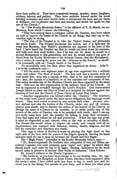
[p. 134]
have been guilty of. They have committed treason, murder, arson, burglary, robbery, larceny, and perjury. They have societies formed under the most binding covenants and most horrid oaths to circumvent the laws, and put them at defiance; and to plunder and bum and murder, and divide the spoils for the use of the Church."
In "The Rocky Mountain Saints" is the affidavit of T. B. Marsh, an ex-Mormon, from which I extract the following:—
"They have among them a company, called the Danites, who have taken an oath to support the heads of the Church in all things that they say or do, whether right or wrong.
"The plan of the Prophet is to take the United States, and ultimately the whole world. The Prophet inculcates the notion, and it is believed by every true Mormon, that Smith's prophecies are superior to the laws of the land. I have heard the Prophet say that he would yet tread down his enemies, and walk over their dead bodies; that if he was not let alone he would be a second Mohammed to this generation, and that he would make it one gore of blood from the Rocky Mountains to the Atlantic Ocean; that like Mohammed, whole motto in treating for peace was the 'Alcoran or the Sword,' so should it be eventually with us, 'Joseph Smith or the Sword.'
To successfully carry out their plans they organized an Army. John D. Lee in his confession says:—
"All the males over eighteen years of age were organized into a military body, and called 'The Host of Israel.' The first rank was a captain with ten men under him; next was a captain of fifty, that is he had five companies of ten; next, the captain of a hundred, or of ten captains and companies of ten. The entire membership of the Mormon Church was then organized in the same way. This was the first organization of the military force of the Church. It was so organized as revealed through the Lord's Prophet. God commanded Joseph Smith to place the Host of Israel in a situation for defence against the enemies of God and the Church of Jesus Christ of Latter Day Saints.
"Another organization was formed called the 'Danites.' The members of this order were placed under the most sacred obligations that language could invent. They were sworn to stand by and sustain each other. Sustain, protect, defend, and obey the leaders of the Church, under any and all circumstances unto death; and to disobey the orders of the leaders of the Church, or divulge the name of a Danite to an outsider, or to make public any of the secrets of the order of Danites, was to be punished with death. And I can say of a truth, many have paid the penalty for failing to keep their covenants. They had signs and tokens for use and protection. When the sign was given it must be responded to and obeyed, even at the risk or certainty of death. The Danite that would refuse to respect the token, and comply with all its requirements, was stamped with dishonor, infamy, shame, disgrace, and his fate for cowardice and treachery was death.
This sign or token of distress is made by placing the right hand on the right side of the face, with the points of the fingers upwards, shoving the hand upwards until the ear is snug up between the thumb and fore finger.
The "High Priest" Journalist in his Rocky Mountain Saints, says:—
"Dr. Avard organized the brethren into companies of tens and fifties, appointed Captains over each company, gave 'signs' and 'grips' by which they should know each other by day or by night, binding themselves by the most sacred oaths to preserve in secrecy their works of darkness," Then follows
Dr. Avard's address to the Danite Captains:—
"My brethren, as you have been chosen to be our leading men, our captains to rule over this Kingdom of Jesus Christ, who have been organized after the ancient order, I have called upon you here to-day to teach you and instruct you in the things that pertain to your duty, and to show you what your
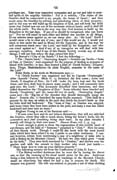
[p. 135]
privileges are. Take your respective companies and go out and take to yourself spoils of the ungodly Gentiles? For it is written, 'The riches of the Gentiles shall be consecrated to my people, the house of Israel;' and thus waste away the Gentiles by robbing and plundering them of their property; and in this way we will build up the kingdom of God, and roll forth the little stone that Daniel saw cut out of the mountain without hands until it shall fill the whole earth. For this is the very way that God destines to build up his Kingdom in the last days. If any of us should be recognized, who can harm us? For we will stand by each other and defend one another in all things. If our enimies swear against us, we can swear also. As 'the Lord' liveth I would swear a lie to clear any of you; and if this would not do, I would put them or him under the sand as Moses did the Egyptian, and in this way we will consecrate much unto 'the Lord,' and build up his Kingdom; and who can stand against us? And if any of us transgress we will deal with him amongst ourselves. And if any of this Danite Society reveals any of these things, I will put him where the dogs cannot bite him."
In Burton's " City of the Saints " I find the following:—
"The 'Danite band,' 'Destroying Angels'—Gentiles say Devils—'Sons of Dan, or Danites,' were organized for the purpose of dealing as avengers of blood with Gentiles; in fact, they formed a kind of 'Death Society,' Desperadoes, Thugs, Hashshashiyun—in plain English, assassins in the name of the Lord."
Elder Hyde, in his work on Mormonism says:—
"A 'Death Society' was organized and led by Captain 'Fearnaught' alias 'Apostle' Patten. Mich. iv. 13 furnished the first name; Arise and thresh, O daughter of Zion; for I will 'make thy horn iron and thy hoofs brass; and thou shalt beat in pieces many people; and I will consecrate their gain unto the Lord.' This accurately described their intentions, and they called themselves the 'Daughters of Zion.' Some ridiculed these bearded and bloody 'Daughters,' and the name did not sit easily. 'Destroying Angels' came next; the 'Big fan of the thresher that should thoroughly purge the floor.' Genesis xlix. 17 furnished the name finally assumed. 'Dan shall be a serpent by the way, an adder in the path that biteth the horse's heels so that his rider shall fall backward.' The 'Sons of Dan,' or Danites was adopted, and many times they have been adders in the path, and many a man has fallen backward and been seen no more."
Brigham Young in one of his Sermons said:—
"If men come here and do not behave themselves, they will not only find the Danites, whom they talk so much about, biting the horse's heels, but the scoundrels will find something biting their heels. In my plain remarks I merely call things by their own name." Deseret News, vol. 7., p. 143.
I trust enough is given to show the organization of this terrible band of cut-throats, and the kind of "Sermons" preached in "Zion." Now for some of their bloody work. Though I could fill this book with the most horrid tales which have been relate to me, I prefer to use other testimony. I cannot however, refrain from mentioning a case of a neighbour of mine who is still a Bishop in the Mormon Church. He had two sons which grew "weak in the faith." They were both murdered by "Danites," and thrown over the garden wall with the remark to their mother who stood just inside:—"There learn how to train up your children properly."
The following extracts are from the Confessions of John D. Lee:—
"The Bishop notified Anderson that he must die by having his throat cut, so that the running of his blood would atone for his sins. Anderson being a firm believer in the doctrines and teachings of the Mormon Church, made no objections, but asked for half a day to prepare for death. His request was granted. His wife was ordered to prepare a suit of clean clothing
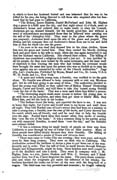
[p. 136]
in which to have her husband buried and was informed that he was to be killed for his sins, she being directed to tell those who enquired after her husband that he had gone to California.
"The Bishop, James Haslem, Daniel McFarland and John M. Higbee dug a grave in a field near the city, and that night about 12 o'clock, went to Anderson's house and ordered him to make ready to obey the Council. Anderson got up, dressed himself, bid his family good-bye, and without a word of remonstrance accompanied those that he believed were carrying out the will of the 'Almighty God.' They went to the place where the grave was prepared; Anderson knelt upon the side of the grave and prayed. The Bishop and his company then cut Anderson's throat from ear to ear and held him so that his blood ran into the grave.
"As soon as he was dead they dressed him in his clean clothes, threw him into the grave and buried him. They then carried his bloody clothing back and gave them to his wife to wash, when she was again instructed to say that her husband was in California. She obeyed their orders. The killing of Anderson was considered a religious duty and a just act. It was justified by all the people, for they were bound by the same covenants, and the least word of objection to thus treating the man who had broken his covenant would have brought the same fate upon the person who was so foolish as to raise his voice against any act committed by order of the Church authorities." Page 283, Lee's Confession, Published by Bryan, Brand and Co., St. Louis, U.S.A. W. H. Stelle and Co., New York.
"A quiet and orderly young man, a Gentile, was notified to let the girls alone. No Gentile was allowed to keep company with or visit any Mormon girl; but he still kept going to see some of them. The authorities decided to have the young man killed, so they called two of Bishop Dames' Destroying Angels, Carter and Gould, and told them to take that cursed young Gentile 'over the rim of the basin.' That was a term used when they killed a person.
"The destroying angels made some excuse to induce the young man to go with them on an excursion, and when they got close to Shirts' Mill, they killed him, and left his body in the bushes.
"The Indians found the body, and reported the facts to me. I was not at home that night, but Carter and Gould went to my house and staid there all night. They told Rachel (one of Lee's wives) they had been on a mission to take a young man, a Gentile, over the rim of the basin, and Carter showed her his sword, which was all bloody, and said he used that to help the Gentile over the edge. Rachel knew what they meant when they spoke of sending him 'over the rim of the basin.' It was a common thing to see parties going out with suspected Gentiles, to send them 'over the rim,' and the Gentiles were always killed.
"It was a common thing for small bands of people on their way from California to pass through by way of Cedar City on their journey. Many of these people were killed simply because they were Gentiles. The killing of Gentiles was considered a means of Grace and virtuous deed.
"Three men came to Cedar City one evening; they were poor, and much worn by their long journey. They were on their way to California. The Authorities ordered the brethren to devise a plan to put them out of the way, decently and in order. That the will of God, as made known through Bishops Haight and Klingensmith, might be done, these helpless men were coaxed to go to the distillery and take a drink. They went in company with J. M. Higbee, John Weston, James Haslem and Wm. C. Stewart, and I think another man, but if so, I have forgotten his name. The party drank consider-able and when the emigrants got under the influence of the whisky, the brethren knocked the brains out of two of the men with the king-bolt of a wagon. The third man was very powerful and muscular; he fought valiantly
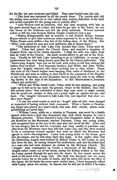
[p. 137]
for his life, but was overcome and killed. They were buried near the city.
"This deed was sustained by all the people there. The parties who did the killing were pointed out as true valiant men, zealous defenders of the faith and as fine examples for the young men to pattern after."
"John Weston took an Irishman, that had been stopping with him as his guest several days, on a hunt and when he got him in the forest, he cut the throat of the Irishman and left the body unburied. Weston received orders to kill the man because Bishop Haight considered him a spy.
"Bishop Klingensmith laid in ambush to kill Robert Keyes, because Keyes refused to give false testimony when requested to do so by the Bishop. When Keyes came within a few feet of the hiding place of the Bishop, this 'Holy' man raised his gun and took deliberate aim at Keyes heart."
"The authorities at Salt Lake City decided that Lieut. Tobin must be killed. Tobin had joined the Church there, and married a daughter of General Rich, one of the twelve Apostles. I think his wife was taken from him by order of the Church. He made several efforts to get out of the Territory. Finally he left Salt Lake intending to go to California, to escape the persecutions that were being forced upon him by the Church authorities. The 'Destroying Angels' were put on his trail, with orders to kill him without fail before they returned. Two desperate fanatics, Joel White and John Willis, were the 'Angels' selected, who knew nothing but to obey orders. These vile tools of the Church leaders were keeping their oaths of obedience to the Priesthood, and were as willing to shed blood at the command of the Prophet or any of the Apostles, as ever Inquisitor was to apply the rack to an offending heretic in the days of the Inquisition. In fact Mormonism is Jesuitism refined and perfected."
"White and Willis found Lieut. Tobin while he was sleeping, and going right up to him as he lay upon the ground, wrapt in his blanket, they shot him several times' they concluded to shoot him once more to make certain that he would not escape, so they put a pistol right up against his eye, and fired. The 'Angels' returned to Salt Lake City and reported that their orders were obeyed."
"It was the usual course to send an 'Angel' after all who were charged or suspected of having violated their covenants. When a Danite or Destroying Angel was placed on a man's track, that man died, certain, unless some providential act saved him."
"William Laney, while on a mission to Tenessee, was saved by a family named Aden from a mob who threatened him with death because he was a Mormon preacher. 'When Fancher's train (The Emigrants killed at Mountain Meadows by the Mormons) reached Parowan, Laney met young Aden, and recognized him as the son of the man who had saved his life. Aden said he was hungry, that he and his comrades had been unable to purchase sup-plies from the Mormons since they left Salt Lake City, and that there seemed to be a conspiracy formed against that train by which the Mormons had agreed to starve the emigrants. Laney took young Aden to his house, gave him his supper, and let him sleep there that night. A few nights after that the Destroying Angels were ordered by Bishop Dame to kill Laney to save him from his sins, he having violated his endowment oath and furnished food to a man who had been declared an outlaw by the Mormon Church. The 'Angels' were commanded by Carter, a son-in-law of the Bishop. The Angels called Laney out of the house, saying the Bishop wished to see him. As Laney passed through the gate into the street, he was struck across the back of the head with a large club. His skull was fractured and for many months Laney lay at the point of death, and his mind still shows the effect of the injury, for his brain has never quite settled since. I have frequently talked with Laney about the matter, he knows that he will yet be killed if he make
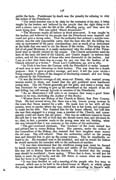
[p. 138]
public the facts. Punishment by death was the penalty for refusing to obey the orders of the Priesthood.
"The sinful member was to be slain for the remission of his sins, it being taught by the leaders and believed by the people that the right thing to do with a sinner, was to take the life of the offending party, and thus save his never dying soul. This was called 'Blood Atonement.'"
"The Mormons nearly all believe in blood atonement. It was taught by the leaders and believed by the people that the Priesthood were inspired and could not give a wrong order. That the authority that ordered a murder committed, was the only responsible party, that the man who did the killing was only an instrument of the party commanding—just as much of an instrument as the knife that was used to cut the throat of the victim. This being the belief of all good Mormons, it is easily understood why the orders of the Priesthood were so blindly obeyed by the people. The Church authorities used the laws of the land, the laws of the Church, and 'Danite Angels' to enforce their orders, and rid the country of those who were distasteful to the leaders. And I say as a fact that there was no escape for any one that the leaders of the Church selected as a victim." From Lee's Confession, pp. 272 to 283.
"In Utah it has been the Custom with the Priesthood to make eunuchs of such men as were obnoxious to their leaders. This was done for a double purpose: first, it gave a perfect revenge, and next, it left the poor victim a living example to others of the dangers of disobeying counsel, and not living as ordered by the Priesthood.
"It was the favorite revenge of old, worn-out Priests, who wanted young women sealed to them, and found that the girl preferred some handsome young man. The old Priests generally got the girls, and many a young man was UNSEXED for refusing to give up his sweetheart at the request of an old and failing, but still sensual Apostle or member of the Priesthood.
"As an illustration I will refer to an instance that many a good Saint knows to be true, (including the Author of this Book.)
"Warren Snow was Bishop of the Church at Manti, San Pete County, Utah. He had several wives, but there was a fair, buxom young woman m the town that Snow wanted for a wife. He made love to her with all his powers, went to parties where she was, visited her at her home, and proposed to make her his wife. She thanked him for the honor offered, but told him she was then engaged to a young man, a member of the Church, and consequently could not marry the old priest. This was no sufficient reason to Snow. He told her it was the will of God that she should marry him, and she must do so; that, in fact, a promise made to the young man was not binding, when she was informed that it was contrary to the wishes of the authorities.
"The girl continued obstinate. The 'teachers' of the town visited her and advised her to marry Bishop Snow. Her parents, under the orders of the Counsellors of the Bishop, also insisted that their daughter must marry the old man. She still refused. Then the authorities called on the young man and directed him to give up the young woman. This he steadfastly refused to do. He remained true to his intended, and said he would die before he would surrender his intended wife to the embraces of another.
"It was then determined that the rebellious young man must be forced by harsh treatment to respect the advice and orders of the Priesthood. His fate was left to Bishop Snow for his decision. He decided that the young man should be mutilated; Snow saying, 'When that is done, he will not be liable to want the girl badly, and she will listen to reason when she knows that her lover is no longer a man.
"It was then decided to call a meeting of the people who live true to counsel, which was to be held in the school-house in Manti, at which place the young man should be present, and dealt with according to Snow's will.

[p. 139]
The meeting was called. The young man was there, and was again requested ordered and threatened, to get him to surrender the young woman to Snow, but true to his plighted troth, he refused to consent to give up the girl. The lights were then put out. An attack was made on the young man. He was severely beaten, and then tied with his back down on a bench, when Bishop Snow took a bowie-knife, and performed the operation in a most brutal manner, and than took the portion severed from his victim and hung it up in the school-house on a nail, so that it could be seen by all who visited the house afterwards.
"The party then left the young man weltering in his blood, and in a life-less condition. During the night he succeeded in releasing himself from his confinement, and dragged himself to some hay-stacks, where he lay until the next day, when he was discovered by his friends. The young man regained his health, but has been an idiot or quiet lunatic ever since, and is well known by hundreds of both Mormons and Gentiles in Utah.
"After this outrage old Bishop Snow took occasion to get up a meeting at the school-house, so as to get the people of Manti, and the young woman that he wanted to marry, to attend the meeting. When all had assembled, the old man talked to the people about their duty to the Church, and their duty to obey counsel, and the dangers of refusal, and then publicly called attention to the mangled parts of the young man, that had been severed from his person, and stated that the deed had been done to teach the people that the counsel of the Priesthood must be obeyed. To make a long story short, will say, the young woman was soon after forced into being sealed to Bishop Snow.
"This is only one instance of many that I might give to show the danger of refusing to obey counsel in Utah." Lee's Confession, p. 285-6.
From page 302, The Rocky Mountain Saints:—
"I was at a Sunday meeting in Provo, when the news of the San Pete castration was referred to by the presiding bishop—Blackburn. Some men in Provo had rebelled against authority, and Blackburn shouted in his Sunday meeting—a mixed congregation of all ages and both sexes—'I want the people of Provo to understand that the boys in Provo can use the knife as well as the boys in San Pete. Boys, get your knives ready, there is work for you! We must not be behind San Pete in good works.'
"This man, Blackburn, was continued in office at least a year after this, and was afterwards taken from his bishopric and sent on a mission to England.
"Many young women were forced to break off engagements with young men whom they loved, to gratify a bishop's preference, a missionary's feelings or a great elder's desires."
From Apostle Kimball's Sermon:—
"I would not be afraid to promise a man who is 60 years of age, if he will take the counsel of Brother Brigham and his brethren, he will renew his age. I have noticed that a man who has but one wife, and is inclined to that doctrine, soon begins to wither and dry up, while a man who goes into plurality looks fresh, young and sprightly. Why is this? Because God loves that man, and because he honors his work and word. Some of you may not believe this; but I not only believe it, but I also know it. For a man of God to be confined to one woman is small business, for it is as much as we can do to keep under the burdens we have to carry, and do not know what we should do if we only had one woman apiece."
From a "Sermon" delivered by Dr. Clinton, Justice of the Peace. Speaking of some men and women that he was not exactly pleased with and after using language unfit for publication, the Doctor said:—
"They ought to be shot with a double-barrelled shot gun. That is my
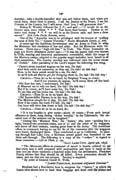
[p. 140]
doctrine; take a double-barrelled shot gun and follow them, and when you catch them, shoot them to pieces. I am the Justice of the Peace, I am the Coroner of the County, but I will never 'find' you, I will guarantee that."
Bishop E. Wooley followed the J. P., and said:—" I would do as the Doctor says, KILL THEM * * * Tear down their houses. THERE IS NO HELP FOR THEM * * * we will do as the Doctor said, and have a clean record." Salt Lake Daily Review, extra.
One of the "Apostles was to be privileged with the honour of 'pulling the nose of little Vic.!' (Queen Victoria)." Rocky Mountain Saints, p. 206.
27 years ago the American Government sent an Army to Utah to whip the Mormons into obedience of law and order. But the Mormons were victorious. There was a "high old time" in Utah. The Priest Journalist on page 372 Rocky Mountain Saints says:—"It was the gayest time ever known in Utah, dancing and theatrical amusements everywhere, while the songs of the Mormon camps, adapted to the popular negro melodies were heard in all their assemblies. The Sunday worship was enlivened with the jovial chorus of 'Dudah.' After partaking of the Lord's supper the following was sung,
'There's seven hundred wagons on the way, Du dah! And their cattle are numerous, so they say, Du dah! du dah day! Now, to let them perish would be a sin, Du dah! So we'll take all they've got for bringing them in, Du dah! Du dah day! CHORUS.—Then let us be on hand, by Brigham Young to stand, And if our enemies do appear, we'll sweep them off the land. 'Old Sam has sent, I understand, Du dah! A Missouri ass to rule our land, Du dah! Du dah day! But if he comes, we'll have some fun, Du Dah! To see him and his juries run, Du dah! Du dah day. CHORUS.—Then let us be on hand, &c. 'Old Squaw-killer Harney is on the way, Du dah! The Mormon people for to slay, Du dah! Du dah day Now if he comes the truth I'll tell, Du dah! Our boys will drive him down to hell, Du dah! Du dah day!" CHORUS.—Then let us be on hand, &c.
"It is too lengthy to give entire—about 16 verses.—From such lyrical effusions as these, sung during 'divine worship' in the Tabernacle, the elevated tone of the sermons can be imagined."
"During this 'Mormon War,' the 'Saints,' who were 'spoiling for a fight,' burned two provision trains, one of 51 and the other of 23 waggons, and drove off their animals, causing great want in the Army. The American officer in command, having no use for 8O of the teamsters after the waggons were burnt, discharged them. They concluded to go to California. In passing through Salt Lake City, a Mormon armed guard was furnished to see them safe through. The following is a copy of the "orders" in regard to these teamsters:—Life in Utah, p. 194.
'SALT LAKE CITY, April 9th, 1858.
"The (Mormon) officer in command of escort is hereby ordered to see that every man is well prepared with ammunition and have it ready at the time you see those teamsters a hundred miles from the settlements. President Young advises that they should be all killed. Every precaution should be taken, and see that not one escapes. Secrecy is required.
"By order of General Daniel H. Wells.
"JAMES FERGUSON, Assistant Adjutant General."
Brigham had a Revelation how to emigrate the "Saints," in which the Saints were shown how to haul their baggage and food over the plains and
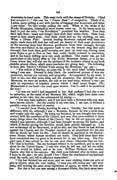
[p. 141]
mountains in hand carts. This went forth with the stamp of Divinity. "God had revealed it; "this was the "Divine Plan" of emigration. Think of it, Ladies, fancy pulling a cart with 200 lbs. of baggage over mountains and dales, 1,500 miles. On they trudge pulling the carts. When in the midst of the Rocky Mountains, tremendous snow storms came on. In the heavy snow its hard to pull the carts, "the Revelation" promised fine weather. Now their faith fails them; weary and hungry their souls faint within them. Their food, scant at best, nearly gone; they wade rivers and no dry clothing, no rest. What a Divine Plan! Several leading Mormons camped with them one night, made them kill their last calf and ate hearty of their scant provisions; in the morning these kind Mormon gentlemen drove their carriages through the river and waited on the opposite bank to see the women drag their carts through, then bade them good morning and sped on their way, leaving these poor dupes to get to Zion as best they could, finally reduced to starvation, and in the heavy drifting snow 250 souls perished. The reader can get full particulars of this horrid affair in The Rocky Mountain Saints, or at my lectures, where they will also see the pictures of the incidents related in my book besides several others, which space precludes my giving here. The following is from Mrs. Smith's "Fifteen Years among the Mormons," pp. 309:—
"The widow of Hartley, 22 years old, is the most heart broken human being I ever saw. Dressed in deep black, the unrelieved picture of woe she presented, excited our curiosity and sympathy. Accompanied by my sister, I went to her, and after some delay and the assurance, that although we were Mormons, we were yet women, she told us her brief story, without a tear; yet with an expression of hopeless sorrow which I shall never forget. Oh! Mormonism is too hard—too cruel upon women. Can it—will it be permitted for ever?
"It was not until I had suggested to her, that perhaps I had also a woe to unburden, as the result of my Mormon life, which might have some comparison to her own, that she commenced by saying:—
"You may have suffered; and if you have been a Mormon wife, you must have known sorrow. But the cruelty of my own fate, I am sure, is without a parallel—even in this land of cruelty.
"I married Jesse Hartly, knowing he was a 'Gentile,' but that made no difference with me, although I was a Mormon, because he was a noble man, and sought only the right. By being my husband, he was brought into closer contact with the members of the Church, and was thus soon enabled to learn many things about the Heads of the Church, that he did not approve, and of which I was ignorant, although I had been brought up among the Saints; and which, if known among the Gentiles, would have greatly damaged us. I do not understand all he discovered, or all he did; but they found he had written against the Church, and the Prophet required as an atonement for his sins that he should lay down his life. That he should be sacrificed in the Endowment House, where human sacrifices are made. They kill those there who have committed sins too great to be atoned for in any other way. The Prophet says, if they submit to this he can save them; otherwise they are lost. Oh! that is horrible. But my husband refused to be sacrificed, and so set out alone for the United States. I told him when he left me, and left his child, that he would be killed, and so he was. William Hickman and another Danite, shot him in the canyons. My child soon followed after its father, and I hope to die also; for why should I live? Here the murderers of my husband curse the earth, and roll in affluence unpunished.
"She had finished her sad story, and we were choking down our sobs of pity in silence, when she rose saying, 'I trust you will excuse me,' and went away, still wearing the same stony expression of agony, as when we first saw her. But this is but one case among a thousand others, that have never seen
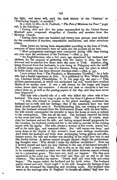
[p. 142]
the light, and never will, until the dark history of the 'Danites,' or Destroying Angels,' is unveiled."
In a work by Mrs. A. G. Paddock, "The Fate of Madame La Tour," page 296, is the following:—
"During 1870 and 1871 the juries empannelled by the United States Marshall were composed altogether of Gentiles and seceders from the Mormon Church.
"During these years one hundred and twenty nine persons were indicted for the commission of murders, unspeakable mutilations, and other atrocious crimes.
These Juries not having been empannelled according to the laws of Utah, everyone of these indictments were set aside and the accused all set free.
"More polygamous marriages were contracted during 1880 than during any year since the settlement of the Territory."—Ibid, p. 324.
"An Englishwoman, who a few years ago abandoned her husband and children for the purpose of gathering with the Saints to Zion, has been divorced and re-married five times since she came to Utah. Another, after being divorced from five husbands, is now living in Polygamy with the sixth. A district judge reports the case of a Saintess, living near the place in which he holds court, who has been divorced fourteen times.—Ibid, p. 342.
I now extract from "The Prophets, or Mormonism Unveiled," by a lady who had a fearful experience in Zion. It is published by Wm. White Smith, 195, Chestnut Street, Philadelphia, U. S. On page 255, she says:—"This modern pandemonium, in which vice unchecked ran riot, would have rivalled Hades in its motley crew. It was a safe retreat for the forger and bogus coiner, house thief, and murderer. I should not dare to chronicle it had not others done so, as well as the passing papers of the day, and they have never been disproved."
This lady tells a fearful tale of a wife who killed the other wife of her husband. The story is too long to give entire, but from it I glean as follows:—
"A wife, who refused to consent to the plural marriage, cautioned her husband not to trifle with her feelings: that if the unnatural knot was tied death should speedily sever it. Notwithstanding this, one evening at supper time, the husband returned from the Endowment House with his new bride; the wife sternly commanded the intruder to leave the house at once, or submit to the consequence. This was all she said. The husband escorted his bride to her room and bade her prepare for supper. The bride, of course, must obey her husband and not his wife; and having arrayed herself gorgeously for the occasion, the husband conducted her to the table to partake of the evening repast with the family. The wife, always a woman of few words, seated herself at the table also, and remained silent. But 'still waters run deep,' and away down in the depths of that woman's heart were feelings unutterable. And while the husband and bride were exchanging loving glances and affectionate words, the wife and mother was deciding in her mind how best to end this fearful torture. A serious mental struggle ensued; finally the predominating thoughts were, 'Why should I make my children motherless? How can I destroy myself and leave my dear children to the care of this hated intruder? No, never! I cannot; I will not. But to live on in this state is impossible; to be constantly worried in mind over this will either dethrone reason or hurry me to a premature grave. This must not, shall not happen.' The idea now uppermost in her mind was 'slay the rival,' and thus put an end to all this vexation. This decided the matter. 'Death shall end what folly and crime began.' The supper ended, the husband and his bride retire. The husband partly turned and said, 'Good night!' to his wife. Imagine the feelings of that wife as she witnessed the disgusting and revolting scene. Her husband who swore at the marriage altar in England 'to forsake all others,' had now for-
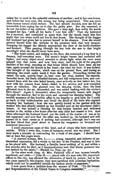
[p. 143]
saken her to revel in the unlawful embraces of another; and in her own house, and before her very eyes, this wrong was being perpetrated. This was more than human nature could endure. She had already decided, now she felt an irresistible force urging her on to slay the guilty pair. But she reasoned, is he not the father of my children. She gave a deep sigh, then softly the words escaped her lips, 'with all his faults I love him still.' Then she hesitated for a moment, and concluded to spare him, but she would teach him that night that two wives could not live in that house. She thought of the dagger her husband had given her to protect herself in his absence. Now she would protect herself from this intruder in his presence with that very weapon. Grasping the dagger she silently approached the door of the bride-chamber and listened. Then peeping through the key hole she saw in that bright moonlight what she should never have seen.
"Her brain reeled, and sinking to the floor, she remained a long time in a dreamy, half-conscious state. The moon's bright beams had ascended still higher, and every object stood revealed in silvery light when she once more peeped into that room, and now they slept, and the sight of the peaceful slumber of her rival, reposing on that breast which should have been all her own, again aroused the demon in her heart; she tried the door: it was locked. She thought of the window, which was on the ground floor, and having no fastening, she could easily reach it from the garden. Proceeding thither she raised the sash, quietly crept in, bent over her rival, marked the smooth, beautiful brow, the finely chiselled features, and full voluptuous form, and contrasted them with her own faded beauty, once as lovely as that before her, but now with the roseate hues faded—faded in his service, and now trampled upon as valueless. She gloated over the sleeping victim, then the steel glittered once in the air, descended, and was raised reeking with the victim's life's blood! Again it descended, when the temporarily insane wife leaped through the window, fled to her room and caressed her sleeping babes! The terrible sequence of this horrible affair is too lengthy to give here, for I could go back to that bridechamber and detail the death of the bride who expired accusing her husband; how she was quietly buried in the garden with her mother who had silently yielded up her troubled soul on her murdered child's bosom. It was indeed a blessing for that broken hearted and widowed mother to die, within a few hours after her only child had ceased to live. And when afterward the husband found out the truth of the matter—it was as he had supposed—and now that the affair was hushed up, the husband and wife passed on in their career as if nothing had occurred, although her's was not the first blood that cried aloud to heaven for vengeance on betrayed and murdered innocence."
I could enumerate cases of this kind, and of others who have committed suicide. While I write this, scores of instances crowd into my mind. But I have made a mistake in contracting for a book of 20O pages. I should have had at least 800 pages more.
"A married woman, Mrs. L——, young, beautiful, and hitherto of unblemished reputation, fell a victim to the arts of the Prophet, and was to him as his plural wife. Her husband, a Gentile, knew nothing of it, and within a few months after he died; as it happened, many men died whose presence was not desired by the saints."—Madam La Tour, pp. 331.
In the same work chap. 18, Mrs. Paddock tells of two women brutally murdered, and adds:—" Julia H——, plural wife of a man who fills important offices in this city, was allowed the alternative of death by poison; but in the two cases named in this chapter, they were sacrificed with attendant barbarities which could not be paralleled outside the darkest abode of paganism."
I now quote from a petition from the women of Utah. "To the Senate and Representatives of tile United States in Congress assembled."
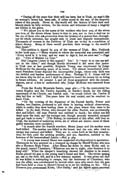
[p. 144]
"During all the years that their will has been law in Utah, no man's life no woman's honor has been safe, if either stood in the way of the despotic rulers of this people. Never in this world will the history of their dark and bloody deeds be fully written, for the victim and witnesses of many a tragedy are hidden in the grave.
"We adjure you in the name of the mothers who bore you, of the wives you love, of the sisters whose honor is dear to you, not to turn a deaf ear to the cry of those who ask protection from the tyranny of a system that, through-out its whole existence, has sought only to crush and degrade womanhood. Thousands of women in the Territory of Utah are to-day in a condition of abject slavery. Many of them would proclaim their wrongs to the world if they dared."
This petition is signed by 474 of the women of Utah. Mrs. Paddock in-her book says;—" Many women to whom the memorial was presented said 'Every word in it is true, and we want to sign it, but we dare not."—Page 337. "Fate of Madam La Tour."
Did Congress Listen to this appeal? Yes! It "went in at one ear and out at the other," and though shortly afterward it did seem that justice in Utah was at last possible, Brigham Young was imprisoned by Judge McKean for the alarming space of 24 hours. Yet almost immediately afterward President Grant deposed the incorruptible Judge, whose only fault was the faithful and fearless performance of duty. Perhaps U. S. Grant will let me know why he did so, and I shall be pleased to insert his reason for so doing in future editions. At present I, and all those acquainted with the circumstances, are at a loss to understand why Judge McKean was removed from office.
From the Rocky Mountain Saints, page 462 :—" In the controversy between Rigdon and the Twelve Apostles, at Smith's death, for the ruling supremacy of the Church, one Parrish said, 'he would follow the Twelve if they led him to hell.' Ten years later his zeal cooled, and he resolved to leave Utah.
"On the evening of the departure of the Parrish family, Potter and Durfee, two Danites, professed to aid them in leaving without observation, while in reality they were leading them to the place where they were to be killed. In the dark, Potter, who decoyed the elder Parrish, was accidentally shot and killed; old man Parrish was stabbed to death; his eldest son fell dead upon the road, and the younger son, though severely wounded, escaped and got back to town." [The Bishop, in command of this affair, still lives in Utah, the husband of numerous wives, six of whom are sisters; none of these guilty wretches were punished.]
"A month after the Parrish murders, Henry Jones and his mother were both killed. The mother was killed in the house, and the son, who tried to escape was pursued and killed. They are to come forth in the first resurrection, for they paid the atoning penalty, and are, therefore, entitled to the honours of the immortalized Saints.—Ibid, p. 469.
"A young man named Skeen was suspected of a disposition to apostatize. Thereupon he was arrested on a trumped up charge by Sheriff Ricks, who was also a Mormon High Priest. After Skeen lay down to sleep Ricks said to the guard, named Chambers, 'Whatever you see to night, your business is to keep still.' When the sleeper's breathing showed his slumber to be sound, Ricks placed his gun to the young man's breast and fired. The victim sprang up, ran to the door, fell, and in a few minutes expired. It was given out that he was killed in attempting to escape, but the testimony of Chambers, who saw the affair, was corroborated by several other men who swore that the gun had been held so close to Skeen's breast as to set his clothing on fire. Yet a Mormon jury pronounced Ricks 'Not Guilty,' and his fellow-saints escorted
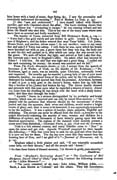
[p. 145]
him home with a band of music, flags flying, &c. I saw the procession and everybody understood the meaning." Fate of Madam La Tour, p. 347.
[I also "saw and understood." I have myself talked with Skeen's mother, and with Chambers about the affair. The burnt clothing shows that if young Skeen was " attempting to escape," he was running toward and not from the Sheriff who shot him. This is but one of the many cases where men have been so arrested and foully murdered.]
The murder of Yates, extracted from Bill Hickman's Book, p. 124—"Yates had a fine gold watch and 900 dollars in gold. Joseph A. Young, a son of Brigham's, said his father wanted that man Yates killed. Col. Jones, Hosea Stout, and another, whose name I do not recollect, came to my camp fire and asked if Yates was asleep. I told them he was, upon which his brains were knocked out with an axe, a grave three feet deep was dug, the body put in and the dirt well packed on it, after which our camp fire was moved on to the grave. We were off before day light, and arrived at Salt Lake that day. My comrade and I went to Brigham's office. He asked what had become of Yates? I told him. He said that was right and a good thing. I pulled out the sack containing the money; the money was counted and we left."
From The Rocky Mountain Saints, p. 736, I extract from the speech of Governor J. B. Weller, of Utah, on the murder of Dr. Robinson:—"Dr. Robinson, aged 31 years, was an amiable, quiet Christian, universally loved and respected. Six months ago he married a young lady of one of your most estimable families. An armed force of the police, sent by the City authorities, destroyed his building and ejected him from his premises. Afterward, between 11 and 12 p.m. a man goes to the doctor's house, wakes him up, tells him that a brother of his (Jones) had broken his leg. The doctor hastily dressed and proceeds with this man upon what he regarded a mission of mercy. About 175 steps from his dwelling he was struck over the head with a sharp instrument, and then shot through the brain."
"Apostle" Snow, in a sermon distinguished by its profanity and brutal ferocity, which was not reported and can only be stated from memory:—" He plainly told the audience that whoever should be the executioner of divine justice and slay the apostate, their wives and children, would receive a bright crown of glory, and, what is more to be lamented, it was approvingly responded to by the audience. It was a sphere of murder, plain, palpable, frightful and sickening. The picture can never be effaced from the mind—a preacher in the pulpit ferociously enjoining the murder of men, women, and children for a difference of opinion, and thousands of faces intently gazing upon him with fanatical approbation. The regions of the damned could scarcely present a scene more truly diabolical.—Secretary Ferris, p. 332, Utah and the Mormons.
Utah is a rich mineral country, and many Gentiles came to "Zion" to open the mines and get rich. Apostle Woodruff preached for their benefit the following:—" Men that come here to seek for our gold and silver find that it is now too hot for them. The day has now come that they cannot bear the burning heat of Zion, and I am glad of it."—Journal of Discourses, vol. 6, p. 141.
Brigham talked a little plainer and said, "If any miserable scoundrels come here, cut their throats,' and all the people said 'Amen!'
"So then these Saints of blessed memory, Cut throats in godly, pure sincerity." Hudibras.
From "Brigham's Destroying Angel," or "The Confession of Bill Hickman, Danite Chief of Utah," page 205, I extract the following account of the "Aikin Massacre":—
"The party consisted of six men: John Aikin, William Aikin, —— Buck, a man known as 'Colonel' and two others. They left Sacramento
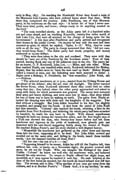
[p. 146]
early in May, 1857. On reaching the Humboldt River they found a train of the Mormons from Carson, who were ordered home about that time. With them they completed the journey. John Pendleton, one of that Mormon party, in his testimony on the case says: 'A better lot of boys I never saw. They were kind, polite, and brave; always ready to do anything needed on the road.'
"The train travelled slowly, so the Aikin party left it a hundred miles out and came ahead, and on reaching Kaysville, twenty-five miles north of Salt Lake City, they were all arrested on the charge of being spies for the Government! A few days after Pendleton and party arrived and recognized their horses in the public Corral. On inquiry he was told the men had been arrested as spies, to which he replied, 'Spies, h—ll! Why, they've come with us all the way.' The party in charge answered that they 'did not care, they would keep them.' The Aikin party had stock, property, and money estimated at 25,000 dollars.
"They were then taken to the city and confined. They were told they should be 'sent out of the Territory by the Southern route.' Four of them started, leaving Buck and one of the unknown men in the city. The party had for an escort, O. P. Rockwell, John Lot,——Miles, and one other. When they reached Nephi, one hundred miles south, Rockwell informed the Bishop, Bryant, that his orders were to 'have the men used up there.' Bishop Bryant called a council at once, and the following men were selected to assist: J. Bigler (now a Bishop), P. Pitchforth, his 'first councillor,' John Kink, and —Pickton.
"The selected murderers, at it p.m., started from the Tithing House and got ahead of the Aikins', who did not start till daylight. The latter reached the Sevier River, when Rockwell informed them they could find no other camp that day; they halted, when the other party approached and asked to camp with them, for which permission was granted. The weary men removed their arms and heavy clothing, and were soon lost in sleep—that sleep which for two of them was to have no waking on earth. The party from Nephi at-tacked the sleeping men with clubs and the kingbolts of the waggons. Two died without a struggle. But John Aikin bounded to his feet, but slightly wounded, and sprang into the brush. A shot from the pistol of John Kink laid him senseless. 'Colonel' also reached the brush, receiving a shot in the shoulder from Port Rockwell, and believing the whole party had been attacked by banditti, he made his way back to Nephi. With almost superhuman strength he held out during the twenty-five miles, and the first bright rays of a Utah sun showed the man, who twenty-four hours before had left them handsome and vigorous in the pride of manhood, now ghastly pale and drenched with his own blood, staggering feebly along the streets of Nephi. He reached Bishop Foote's, and his story elicited a well-feigned horror.
"Meanwhile the murderers had gathered up the other three and thrown them into the river, supposing all to be dead. But John Aikin revived and crawled out on the same side, and hiding in the brush, heard these terrible words, ' Are the damned Gentiles all dead, Port?
'All but one—the son of a b—— ran.'
"Supposing himself to be meant, Aikin lay still till the Danites left, then without hat, coat, or boots, on a November night, the ground covered with snow, he set out for Nephi. Who can imagine the feelings of the man? Unlike 'Colonel' he knew too well who the murderers were, and believed himself the only survivor. To return to Nephi offered but slight hope, and incredible as it may appear he reached it next day. He sank helpless at the door of the first house he reached, but the words he heard infused new life into him. The woman said to him, 'Why another of you ones got away from the robbers, and is at Brother Foote's.' 'Thank God; it is my brother,' he said,
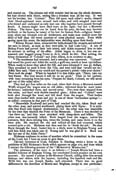
[p. 147]
and started on. The citizens tell with wonder that he ran the whole distance, his hair clotted with blood, reeling like a drunken man all the way. It was not his brother, but 'Colonel.' They fell upon each other's necks, clasped;heir blood-spattered arms around each other, and with mingled tears and sobs kissed and embraced as only men can who together have passed through death. A demon might have shed tears at the sight—but not a Mormon Bishop. The fierce tiger can be lured from his prey, the bear may become civilized, or the hyaena be tamed of his lust for human flesh—religious fanaticism alone can triumph over all tenderness, and make man tenfold more the child of hell than the worst passions of mere physical nature. Even while gazing upon this scene, the implacables were deciding upon their death.
"Bishop Bryant came, extracted the balls, dressed the wounds, and advised the men to return, as soon as they were able, to Salt Lake City. A son of Bishop Foote had proved their best friend, and Aikin requested him to take his account in writing of the affair. Aikin began to write it, but was unmanned. and begged young Foote to do it, which he did.- That writing, the dying declaration of 'Colonel' and John Aiken, is in existence to-day.
The murderers had returned, and a new plan was concocted. 'Colonel' bad saved his pistol and Aikin his watch, a gold one, worth at least 250 dollars. When ready to leave they asked the bill, and were informed it was 30 dollars. They promised to send it from the City, and were told that 'would not do.' Aikin then said, 'Here is my watch and my partner's pistol—take your choice.' Foote took the pistol. When he handed it to him Aikin said, 'There, take my best friend. But God knows it will do us no good.' Then to his partner, with tears streaming from his eyes, 'Prepare for death, Colonel, we will never get out of this valley alive.'
They had got four miles on the road, when their driver, a Mormon named Wolff, stopped the wagon near an old cabin; informed them he must water his horses; unhitched them, and moved away. Two men then stepped from the cabin, and fired with double-barreled guns; Aiken and 'Colonel' were both shot through the head, and fell dead from the wagon. Their bodies were then loaded with stone and put in one of those ' bottomless springs'—so called—common in that part of Utah.
"Meanwhile Rockwell and party had reached the city, taken Buck and the other man, and started southward, plying them with liqour. It is probable that Buck only feigned drunkenness; but the other man was insensible by the time they reached the Point of the Mountain. There it was decided to 'use them up,' and they were attacked with slung-shots and billies. The other man was instantly killed. Buck leaped from the wagon, outran his pursuers, their shots missing him, swam the Jordan, and came down it on the west side. He reached the city and related all that had occurred, which created quite a stir. Hickman was then sent for to 'finish the job.' He shot Buck through the head, buried him in a ditch, went to Brigham Young and told him Buck was taken care of. Young said he was glad of it. Buck was the last one of the Aikin Party."
Hickman confesses to scores of murders which he committed in the name of the Lord, but I have no room to give them.
The late Governor of Utah, Stephen S. Harding, wrote a letter to the publisher of Bill Hickman's Book which appears on page 210, and from which I extract the following account of the "MORRISITE MASSACRE."
The substance of the story is as follows:—" Joseph Morris had been a faithful follower of Brigham Young, but concluded to turn prophet on his own account. He caused a schism in the Mormon Church, calling after him several bishops and elders, with the laymen, including five hundred rank and file. With him was one Joseph Banks, well educated. There was no great difference in the doctrines of Morris and Brigham, except in one particular:
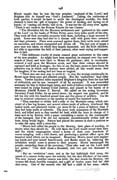
[p. 148]
Morris taught that he Was the true prophet, 'anointed of the Lord,' and Brigham that he himself was 'God's Anointed.' Taking the testimony of both parties, it would be hard to settle the theological muddle, for both claimed to have the 'gift of tongues,' the power of healing, and laying on of hands,' of 'casting out devils,' and so on. It was but the old story over again; 'There is not room in the Roman Empire for two Caesars.'
"The Morrisites left the Mormon settlements and 'gathered in the name of the Lord' on the banks of Weber River, some forty miles north of the city. They took all their moveable property with them, including a large amount of grain. Some men they had sent to a distant mill with grain were arrested and kept prisoners. Fines were assessed against them, their cattle were seized on execution, and others stampeded and driven off. The last cow of many a poor man was taken, on which they largely depended, and the little children, not able to appreciate the faith of their parents, often went crying and supper-less to bed.
"This deliberate cruelty of course created great excitement in the camp of the new prophet. As might have been expected, he stepped over the commands of Jesus, and went back to Moses for guidance; and, in retaliation, ordered a raid upon the Mormon stock, and that their owners should be captured and held as hostages. As this, to say the least, seems to have been the primitive way in which such matters were settled, all this would seem food for laughter, if the ending had not been so tragical.
"There was one easy way to settle it : to stop the wrongs continually inflicted upon these poor and deluded people. But the 'authorities' had other views. Twelve hundred miles separated Brigham's kingdom from the last belt of civilization, and he was 'monarch of all he surveyed.' It was somewhat necessary for him to follow legal forms, and writs of habeas corpus and warrants were issued by Judge Kinney (Chief Justice), and placed in the hands of (a Mormon) Sheriff Robert T. Burton. He called on the acting Governor, Secretary Frank Fuller, for an armed posse; his request was granted, and he left the city with five hundred armed men and five pieces of artillery. On the way he received volunteers to the number of nearly five hundred more.
"They marched to within half a mile of the Morrisite camp, which consisted of a few log houses, and several others made of willows, interlaced like basket-work, and plastered inside—no more fit for a place of defence than if they had been made of cobwebs. The posse took possession of the Morrisite herd, and killed such as they needed for beef, while the boys in charge of it were sent in by Burton with a paper containing a notice to the commander of the besieged, that if he did not surrender unconditionally within half an hour, firing would begin. Burton had placed his cannon in such a position as to rake the camp with a cross-fire.
"Morris had called his people to the Bowery, their place of worship, to decide what they should do. He told them the Lord would reveal their duty and the whole congregation raised a hymn of their own, hundreds of voices mingling with a wild charm, and producing a spirited effect upon the fanatical mind which can be imagined. Meantime Moms stood with imploring hands and eyes turned heavenward, and Banks stood by, believing the revelation would come in answer to their prayers. Morris encouraged his people, reminding them of the promises, 'They who wait on the Lord shall not perish,' 'One shall chase a thousand, and two put ten thousand to flight.'
"But no 'revelation' came, and as the last hallelujah died away, the sound of a cannon broke upon the melody, but the shot fell short of the camp. The next instant another cannon was fired, the shot struck the Bowery, two women fell dead, horribly mangled, and a girl of twelve years had her chin shot away. One of the women who fell had a child in her arms, which,
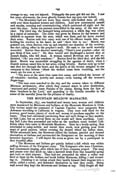
[p. 149]
strange to say, was not injured. Unhappily the poor girl did not die. I saw her years afterwards, the most ghastly human face my eyes ever beheld.
"The Morrisites had not more than ninety able-bodied men, all told, with over three hundred women and children. And now commenced assault and repulse, scouting and counterplotting, which continued all night and the next two days. Some ten persons were killed in the camp, of the new prophet. The third day, the besieged being exhausted, a white flag was raised as a signal of surrender. The order was given by Burton for the women and children to separate from the men, which was done, and the latter stacked their arms. Burton rode into camp with one of his officers beside him, and holding his revolver in his hand, he said 'show him to me.' Moms was pointed out, when Burton rode up and emptied one chamber of his revolver, the shot taking effect in the prophet's neck. He sank to the earth mortally wounded. Burton then shouted sneeringly, 'There's your prophet—what do you think of him now?' He then turned and discharged a second shot at Joseph Banks, who fell dead. A woman named Bowman ran up and exclaimed, 'Oh! you cruel murderer! 'Burton fired his third shot, and she fell dead. Morris was meanwhile struggling in the agonies of death, when a Danish woman raised him in her arms, crying bitterly. Burton rode up to her and shot her through the heart, and the spirits of the victims mingled in one company to that bourne 'where the wicked cease from troubling, and the weary are for ever at rest.'
"The posse at the same time came into camp, and robbed the houses of all valuables—watches, jewelry and money—even tearing off the women's finger rings.
"The men were marched to the city, and the women taken to different Mormon settlements, after which they roamed about in utter destitution, 'scattered and peeled,' mere Pariahs of the plains, fleeing from the face of their 'brethren in the Lord,' and appealing to the Gentile traveller in the name of the merciful Jesus for the pittance of charity.
THE MOUNTAIN MEADOW MASSACRE.
In September, 1857, one hundred and twenty men, women and children were massacred by Mormons and Indians, at the Mountain Meadows in Utah. The victims under the command of Captain Fancher, were emigrants from Arkansas travelling to California in wagons. They were well fixed for the journey, good teams, plenty of stock and money to purchase supplies on the route. They had calculated purchasing flour and such things as they needed, at Salt Lake, but on arrival there, no one would sell them anything. Leaving Salt Lake they proceeded 300 miles on the southern route toward California when they came to Mountain Meadows. Here by a lovely spring, they concluded to camp awhile, and recruit their stock, now getting poor from want of good pasture, before crossing the dessert which lay before them. While encamped here, the Mormons rallied the Indians, painted and dressed themselves as Indians and surrounded the Emigrants on the morning of their intended departure. I will depict the scene as given me by a participant in that dreadful affair.
"The Mormons and Indians got quietly behind a hill which was within calling distance of the Emigrant camp. The Emigrants who were Christians, had commenced singing, after which one of their company prayed. The song and prayer over they hitch up, take a farewell drink from that beautiful spring and start on their journey. They had not proceeded far when a volley was fired at them by the Indians and mock Indian Mormons, killing 7 and wounding 16. Thinking it an Indian attack they hastily formed their wagons into a circle, called a corral, and defended themselves as best they could. Being well armed they kept the Mormons and Indians at bay. They fought all that
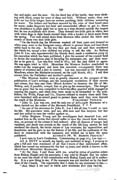
[p. 150]
day and night, and the next. On the third day of the battle, they were choking with thirst, weary for want of sleep and food. Without water, they can hold out but little longer, here are women parching, little children screaming for water. The fathers and brothers aroused by the cries of their loved ones for water, make desperate but fatal and unsuccessful efforts to get it; there was abundance in plain sight but so soon as a man showed outside the wagon fort he was mercilessly shot down. They dressed two little girls in white, and with white flags in their hands started them with a bucket to fetch water from the spring. Two well aimed shots from Mormon rifles ended the thirst and misery of those two dear little girls.
"On the fourth day the Mormons washed off their paint and dressed as white men, went to the Emigrant camp, offered to protect them and lead them safely back to the city. In this way they got them out and then murdered the whole lot, except a few children too young to tell the tale. As Bishop John D. Lee, who superintended the bloody deed, made a confession prior to his execution which has been published, I give the account of the council held to devise the treacherous plan of decoying the emigrants out, and their murder as he gave it. Lee was first tried in 1875, but the jury failed to agree. He was again tried in 1876. Meantime the Mormon leaders concluded to make Lee the scape-goat, and have him executed, consequently there was plenty of evidence and a jury to convict. Lee was executed at the Mountain Meadows, where the Massacre occurred, on the 25th March, 1877. I will first extract from the Publishers and Author's preface.
"The Mormon leaders were so greatly alarmed at the prospect of the publication of Lee's writings, and the consequent revelations of their secrets and crimes, that they sent their 'Blood Atoners' to threaten the life of Mr. Bishop, and, if possible, compel him to give up his manuscripts. The danger was so great that he was compelled to have his office guarded while engaged in copying the papers; and when they were ready to be forwarded to the publishers, the Wells, Fargo and Co., Express refused to receive them until they were furnished with an armed guard to protect them until they were beyond the reach of the Mormons. PUBLISHERS' PREFACE.
"John D. Lee was one, and the only one of fifty-eight Mormons who there carved out the orders of the Mormon Priesthood. * * *
"As one of the attorneys for John D. Lee I did all that I could to save his life. My associates were, and are, able men and fine lawyers, but fact and fate united to turn the verdict against us.
"After Brigham Young and his worshippers had deserted Lee, and marked him as the victim that should suffer to save the church from destruction, on account of the crimes it had ordered; after all chances of escape had vanished, and death was certain as the result of the life-long service he had rendered the church, the better nature of Lee overcame his superstition and fanaticism, and he gave to me the history of his life, and his confession of the facts in connection with the massacre, and wished me to have the same published. AUTHOR'S (W. W. BISHOP) PREFACE.
"I now turn to Lee's Confession. Commencing on page 213, Lee says:—
AS A DUTY to myself, my family, and mankind at large, I propose to give a full and true statement of all that I know of that unfortunate affair, which has cursed my existence for the last 19 years, and which is known as the MOUNTAIN MEADOWS MASSACRE.
"At the time, I and those with me, acted by virtue of positive orders from Bishop Haight and his associates, I was told by Haight that his orders to me were the result of full consultation with Bishop Dame and all in authority. It is a new thing to me, if the massacre was not decided on by the head men of the Church. The superiority that I claim for my statement is this:—
"ALL, THAT I DO SAY IS TRUE AND NOTHING BUT THE TRUTH,
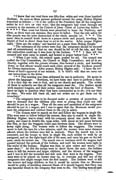
[p. 151]
"I know that our total force was fifty-four white and over three hundred Indians. As soon as those persons gathered around the camp, Bishop Higbee reported as follows:—'It is the orders of the President that all the emigrants must be PUT OUT OF THE WAY,' that the emigrants had come through our country as the enemies of the Church of Jesus Christ of Latter-day Saints. * * * * * * That none but friends were permitted to leave the Territory, and that, as these were our enemies, they must be killed. That the only safety for the people was the utter destruction of the whole rascally lot. * * * The men then in council knelt down in a prayer-circle and prayed, invoking the Spirit of God to direct them how to act in the matter. After prayer Higbee said, 'Here are the orders,' and handed me a paper from Bishop Haight.
"The substance of the orders were that the emigrants should be decoyed and all exterminated, so that no one should be left to tell the tale, and then the authorities could say it was done by the Indians. * * * I then left the council and went away to myself, and bowed in prayer before God. * * *
"When I got back, the council again prayed for aid. The council was called the City Counsellors, the Church or High Counsellors; and all in authority, together with the private citizens, then formed a circle, and kneeling down, so that elbows would touch each other, several of the brethren prayed for Divine instructions. After prayer, Bishop Higbee said: 'I have the evidence of God's approval of our mission. It is God's will that we carry out our instructions to the letter.
" * * The meeting was then addressed by one in authority. He spoke in about this language: 'Brethren, we have been sent here to perform a duty. It is a duty that we owe to God, and to our church and people. The orders of those in authority are that all the emigrants must die. Our leaders speak with inspired tongues, and their orders come from the God of Heaven. We have no right to question what they have commanded us to do; it is our duty to obey. We must kill them all, and our orders are to get them out by treachery.'
"The emigrants were to be decoyed under a promise of protection. I was to demand that the children who were so young they could not talk should be put in a wagon. Then all the arms and amunition of the emigrants should be put in a wagon, and I was to agree that the Mormons would protect the emigrants and conduct them to the city in safety.
"The women were to march on foot and follow the wagons in single file. The men were to follow behind the women, they also to march in single file. Bishop Higbee was to stand with his company about 200 yards from the camp, and stand in double file, open order, with about 20 feet space between the files, so that the waggons could pass between them. The drivers were to keep right along. The women were to follow the waggons. The troops were to halt the men for a few minutes, until the women were some distance ahead, where the Indians were hid in ambush. Then the march was to be resumed, and the troops to form in single file, each soldier to walk by an emigrant, and on the right-hand side of his man, and carry his gun on the left arm, ready for instant use. The march was to continue until the wagons had passed beyond the ambush of the Indians, and until the women were right in the midst of the Indians. Higbee was then to give orders and words, 'Do your duty!' At this the troops were to shoot down the men; the Indians were to kill the women and larger children, and the drivers of the waggons and I was to kill the wounded and sick men that were in the wagons. Two men were to be placed on horses near by, to overtake and kill any of the emigrants that might escape from the first assault. The Indians were to kill the women and large children, so that it would be certain that no Mormon would be guilty of shedding innocent blood—if it should happen that there was any innocent blood in the company that were to die. Our leading men all said
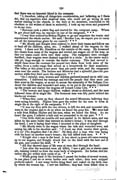
[p. 152]
that there was no innocent blood in the company.
"I, therefore, taking all things into consideration, and believing, as I then did, that my superiors were inspired men, who could not go wrong in any matter relating to the church, or the duty of its members, concluded to be obedient to the wishes of those in authority, I took up my cross and prepared to do my duty.
"Bateman took a white flag and started for the emigrant camp. When he got about half way, he was met by one of the emigrants. * * *
"I was then ordered by Bishop Higbee to go and negotiate the treaty and superintend the whole matter. He said, 'Brother Lee, we expect you to carry out all the instructions given by our council.' * * *
"McMurdy and Knight were ordered to drive their teams and follow me to haul off the children, arms, etc. I walked ahead of the wagons to the corral. I there met Mr. Hamilton on the outside of the camp. He loosened the chains from some of the wagons and moved one wagon out of the way, so that our teams could drive into their camp. The emigrants were strongly fortified; their wagons were chained together in a circle. In the centre was a rifle pit, large enough to contain the entire company. This had served to shield them from the constant fire poured into them from both sides of the valley, from a rocky range that served as a breastwork for their assailants. The valley at this point is not more than 500 yards wide, and the emigrants were near the centre. The Indians and Mormons had a splendid place for protection while they fired upon the emigrants. * * *
"As I entered, men, women and children gathered around me in wild consternation. I delivered my message and told the people that they must put their arms in the wagon, so as not to arouse the animosity of the Indians, I ordered the children and wounded and arms, to be put in the wagons, I hurried up the people and started the wagons off toward Cedar City. * * *
"The women and larger children walked ahead as directed, and the men followed them all in single file. The foremost man was fifty yards behind the hindmost woman.
"When they came up they cheered the armed Mormons, believing they were acting honestly. Higbee then gave the orders for his men to form in single file at the right of the emigrants. * * *
"It was my duty with the two drivers, to kill the sick and wounded who were in the wagons and to do so when we heard the guns fire. We were half a mile from Bishop Higbee and his men, when we heard the firing. As we heard the guns, I ordered a halt and we proceeded to do our part. * * *
"One little child six months old was carried in its fathers arms, and was killed by the same bullet that entered its father's breast; it was shot through the head, I saw it laying dead when I returned to the place of slaughter.
"McMurdy went to the wagon where the sick and wounded were, and raising his rifle to his shoulder said: "O Lord, my God, receive their spirits, it is for Thy kingdom that I do this.' He then shot a man who was laying with his head on another man's breast; the ball killed both men. * * *
"Knight shot a man in the head. A boy about 14 years old came running up to our wagons, and Knight struck him on the head with the butt end of his gun, and crushed his skull. * * *
"All that showed signs of life were at once shot through the head.
"Just after the wounded were all killed, I saw a girl, ten or eleven years old, running toward us from the main body of emigrants. An Indian shot her before she got within sixty yards of us. * * *
"While going back to the brethren I passed the bodies of several women. In one place I saw six or seven bodies near each other; they were stripped perfectly naked. I saw many bodies lying dead and naked on the field, near by where the women lay. I saw ten children; they had been killed close to

[p. 153]
each other; they were from ten to sixteen years of age. The bodies of the women and children were scattered along the ground for quite a distance before I came to where the men were killed. * * *
"When I reached the place where the dead men lay, I was told how the orders had been obeyed. Bishop Higbee said, 'The boys have acted admirably they took good aim, and all of the d—d Gentiles, but two or three fell at the first fire.' He said that three or four got away some distance, but the men on horses overtook them and cut their throats. * * *
"The bodies of men, women, and children had been stripped entirely naked, making the scene one of the most loathsome and ghastly that can be imagined.
"The brethren piled the dead bodies up in heaps, in little gullies, and threw dirt-over them. The bodies were only lightly covered, for the round was hard, and the brethren did not have tools to dig with. I suppose it is true the first rain washed the bodies all out again, but I never went back to examine. * * *
"The brethren were called up, and Higbee and Klingensmith, as well as myself, made speeches, and ordered the people to keep the matter a secret from the entire world. Not to tell their wives nor their most intimate friends, and we pledged ourselves to keep everything relating to the affair a secret during life. We also took the most binding oaths to stand by each other, and to always insist that the massacre was committed by Indians alone. This was the advice of Brigham Young, too, as I will show hereafter.
"It was voted unanimously that any man who should divulge, or tell who was present, or do anything that would lead to a discovery of the truth, should suffer death. The brethren all took a most solemn oath, binding themselves under the most dreadful and awful penalties to keep the whole matter secret, from every human being as long as they should live. No man was to know the facts. The brethren were sworn not to talk of it among themselves, and each swore to help kill all who proved traitors to the Church or people in this matter. * * *
"Bishop Dame then blest the brethren and we prepared to go to our homes. * * *
"According to the orders of Bishop Haight, I started for Salt Lake City to report the whole facts connected with the massacre to Brigham Young. I started about a week or ten days after the massacre, and was on the way about ten days. 'When I arrived in the City I went to the President's house and gave Brigham Young a full, detailed statement of the whole affair from first to last. I went over the whole affair and made as full a statement as it was possible for me to give. * * * He asked me many questions, and I told him every particular. * * * Brigham then said: Isaac (referring to Haight) has sent me word that, if they had killed every man, woman, and child in the outfit (there was 16 small children spared), there would not have been a drop of innocent blood shed by the brethren.'
"I gave him the names of every man that had been present at the massacre. I told him who killed various ones. In fact, I gave him all the information there was to give.
"When I finished talking about the matter, he said, 'Brother Lee, I am afraid of treachery among the brethren that were there. If any one tells this thing so that it will become public, it will work us great injury. I want you to understand now that you are never to tell this again, not even to Heber C. Kimball. It must be kept a secret among ourselves. When you get home I want you to sit down and write a long letter, and give me an account of the affair, charging it to the Indians. You sign the letter as Farmer to the Indians, and direct it to me as Indian Agent. I can then make use of such a letter to keep off all damaging inquiries.'
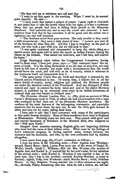
[p. 154]
"He then told me to withdraw and call next day.
"I went to see him again in the morning. When I went in, he seemed quite cheerful. He said:—
'I have made that matter a subject of prayer. I went right to God with it, and asked him to take the horrid vision from my sight, if it was a righteous thing that my people had done in killing those people at the Mountain Meadows. God answered me, and at once the vision was removed. I have evidence from God that he has overruled it all for good, and the action was a righteous one and well intended.
"'The brethren acted from pure motives. The only trouble is they acted a little prematurely: they were a little ahead of time. I sustain you and all of the brethren for what they did. All that I fear is treachey on the part of some one who took a part with you, but we will look to that.
"I was again cautioned and commanded to keep the whole thing as a sacred secret, and again told to write the report as Indian Farmer, laying the blame on the Indians. That ended our interview, and I left him, and started for home."
Judge Hemingrey when before the Congressional Committee, having read to them what I have just given, says:—" This statement bears the impress of truth. It is the dying declaration of an old man of sixty-five, not only made in full view of eternity, but made with a determination that the world should know the truth, and told with an air of veracity, which is inherent in the statement itself, and inseparable from it.
"The same power I have thus set forth and described, is claimed for the Church and its Priesthood to-day. Of course, then, it follows that in all the minor details of society, social, religious and political, the Mormon people are under the absolute control of the Priesthood. And any disregard of their control and right to control the body, mind and soul of the abject Mormon subject, is punished by an ostracism more cruel in its hellish inventions of torment than any ever known to civilized man."
The Christian Herald, London, Nov. 21, 1883, gives an account of Miss Carter's Missionary work in Utah, in which she had a conversation with a man who confessed he had been one of the Mountain Meadow murderers. He confirms all the main features of the beforegoing statements, and especially mentions that he never closes his eyes but he sees the little girls dressed in white and sent out for water, falling dead there.
I have only to add that I have conversed with many of the participants in that awful human butchery. Many of these murderers have been in England as Missionaries. Probably some are here now. They preach with great zeal and convert thousands of Britishers to the Mormon faith, who emigrate to this "Hell upon Earth."
Imagine these assassins marrying English girls, and begetting children who must feel the curse of their fathers crime. What must be the feelings of Lee's numerous progeny, he having married many women between the massacre and his execution, and who, by his own confession had 64 children altogether.
I now quote from page 289 of Lee's confession as follows:—
I took my wives in the following order:—First Agatha Ann Woolsey; second, Nancy Berry; third, Louisa Free (now one of the wives of Daniel H. Wells); fourth, Sarah C. Williams; fifth old Mrs. Woolsey (the mother of Agatha Ann and Rachel A. (I married her for her soul's sake, for her salvation in the eternal state); sixth Rachel A. Woolsey (I was married to her at the same time that I was to her mother); seventh Andora Woolsey (a sister to Rachel); eighth, Polly Ann Workman; ninth, Martha Berry; tenth, Delithea Morris. In 1847, Brigham Young married me to three women in one night, viz., eleventh, Nancy Armstrong (she was what we call a widow, she left her
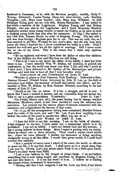
[p. 155]
husband in Tennessee, to be with the Mormon people); twelfth, Polly V. Young; thirteenth, Louisa Young (these two were sisters), 14th, Emeline Vaughan; 15th, Mary Lear Groves; 16th, Mary Ann Williams. In 1858 Brigham Young gave me my 17th wife, Emma Batchelder. I was sealed to her while a member of the Legislature. Brigham Young said that Bishop Haight, who was also in the Legislature and I (both Mountain Meadow assassins) needed some young women to renew our vitality, so he gave us both a dashing young bride (one year after the massacre). In 1859 I was sealed to my 18th wife, Teressa Morse, by order of Brigham Young. The last wife I got was Ann Gordge; Brigham gave her to me. This was my 19th, but, as I was married to old Mrs. Woolsey for her soul's sake, and she was near sixty years old when I married her, I never considered her really as a wife. Truly I treated her well and gave her all the rights of marriage. Still I never count her as one of my wives. That is the reason that I claim only eighteen true wives.
"By my eighteen real wives I have been the father of sixty-four children. Ten of my children are dead and fifty-four are still living.
"This is all I care to say about the affairs of my family, I have but little more to say. I have selected Wm. W. Bishop, my attorney, to publish my confessions, so that the world may know just what I did, and why I acted as I have done. I have delivered to Mr. Bishop all the Manuscripts and private writings and wish him to have all that I may hereafter write."
CONCLUSION OF THE CONFESSION OF JOHN D. LEE.
"Written in prison at Fort Cameron, Utah Territory. Delivered to Hon. Sumner Howard (United States Attorney) by John D. Lee, on the field of execution (just before the sentence of death was carried into effect), and forwarded to Wm. W. Bishop by Hon. Sumner Howard, according to the last request of John D. Lee.
"Death to me has no terror. It is but a struggle, and all is over. I know that I have a reward in heaven, and my conscience does not accuse me. This to me is a great consolation. FAREWELL! JOHN D. LEE."
"On Friday, March 23rd, 1877, the guard having Lee in charge, reached Mountain Meadows, where it had been decided to carry the sentence into execution. Lee pointed out the various places of interest connected with the massacre, and recapitulated the horrors of that event.
"At 10.35, all the arrangements having been completed, Marshal Nelson read the order of the court, and said " Mr. Lee, if you have anything to say before the order of the court is carried into effect, you can do so."
THE LAST WORDS OF JOHN D. LEE.
"I have but little to say this morning. I am on the brink of eternity I feel resigned to my fate, I have made out a manuscript which is to be published. I am not an infidel. I have not denied God and His mercies. I am a strong believer in those things. Most I regret is parting with my family. (Here he rested two or three seconds). These touch a tender chord within me. (Here his voice faltered) I declare my innocence of doing anything designedly wrong in all this affair. I would have given worlds if I could have' averted that calamity.
"Not a particle of mercy have I asked of the court, the world, or officials to spare my life. I do not fear death. I shall never go to a worse place than I am now in. [NOTE, Lee's last words admit Utah to be a Hell upon Earth. There's no place worse than Hell].
"I am a true believer in the Gospel of Jesus Christ. I do not believe everything that is now being taught and practised by Brigham Young, I do not care who hears it. It is my last word—it is so. I believe he is leading the people astray, downward to destruction.
"Having said this I feel resigned, I ask the Lord my God, if my labors
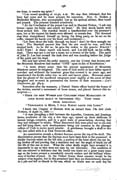
[p. 156]
are done, to receive my spirit."
"Lee ceased speaking at 10.50, A.M. He was then informed that his hour had come and he must prepare for execution. Rev. G. Stokes a Methodist Minister, who accompanied Lee as his spiritual adviser, then knelt and prayed. The prisoner listened attentively.
"At the Conclusion of the prayer Lee said to Marshal Nelson, 'I ask one favour—spare my limbs and centre my heart.' He then shook hands with those around him. The marshal bound a handkerchief over the prisoner's eyes, but at his request his hands were allowed to remain free. The doomed man then strengthened himself up facing the firing party, as he sat on his coffin, clasped his hands over his head, and exclaimed:—
'Let them shoot the balls through my heart! don't let them mangle my body! The Marshall assured him that the aim would be true, and then stepped back. As he did so, he gave the orders to the guards: READY! AIM! FIRE! A sharp report was heard, and Lee fell back on his coffin, dead. There was not a cry nor a moan nor a tremor of the body. The spirit of John D. Lee had crossed the dark river and was standing before the Judge of the quick and the dead.
His soul had solved the awful mystery, and the CURSE that hovers over the Mountain Meadows had marked 'ONE' upon its list of Retribution.'
"A more dreary scene than the present appearance of Mountain Meadows cannot be imagined. The curse of God seems to have fallen upon it scorched and withered the luxuriant grass that covered it 20 years ago, and transformed the fertile valley into an arid and barren plain. Mormons assert that the ghosts of the murdered emigrants meet nightly at the scene of their slaughter and re-enact in pantomime the horrors of their massacre.—Lee's Confession, pp. 384-9.
Sometime after the massacre, a United States officer buried the bones of the victims, erected a monument of loose stones, and placed thereon this inscription:—
"HERE 120 MEN WOMEN AND CHILDREN WERE MASSACRED IN COLD BLOOD EARLY IN SEPTEMBER 1857. THEY WERE FROM ARKANSAS. "VENGEANCE IS MINE, I WILL REPAY SAITH THE LORD."
I finish this Chapter of Horrors with an extract from The Salt Lake Tribune, of April to, 1881:—
"A man ploughing a field between the Apostles, Cannons, and Jennings farms, southwest of the city a few days ago, turned up three skeletons of human beings, complete, and in a good state of preservation, showing that they had belonged to adults. When discovered they were piled out to one side and left lying there, such developments being too common in the pleasant valleys of Utah to excite much wonder. A gentleman brought a skull to this city and called with it at THE TRIBUNE office.
An examination reveals a distinct fracture across the top of the skull. The discoloration proves that the fracture must have been fatal to the possessor: A similar fracture exists on the left side, a portion of the bone above the eye being broken off and proving that a murderer and not the angel of death cut off the life of this one at least. What the other skulls might have revealed it is impossible to say as they were not seen by our informant. The condition of the one referred to indicates that the burial was made not a great many years ago as the bones present a remarkably smooth surface and the brilliant whiteness of mother of pearl. In the United States these remains would be the subject of an inquest, but in this promised land they are dismembered, dumped in a pile and left to bleach in the sun, which no doubt sees on each day the
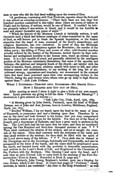
[p. 157]
man or men who did the foul deed walking upon the streets of Zion.
"A gentleman, conversing with THE TRIBUNE, reporter about the find, said it was almost an everyday occurrence. 'There have been not less than five hundred murders committed in this valley alone (there are scores of valleys in Utah) and its history, if written, would be one of blood. It couldn't be written properly unless it was written in blood, and it would be too horrible to read and expect thereafter any peace of mind.'"
"When the history of the Mormon Church is faithfully written, it will chronicle such a black and hideous catalogue of crime committed in the name of God, as will forever put to blush the Spanish Inquisition, or the foulest atrocities that the heart of man, possessed of the fiend's misanthropy and religious fanaticism, has ever conceived. In proof of this, the Mountain Meadows Massacre; the conspiracy against the Morrisites; the murder of the Aiken party; the killing of Yates, and scores of other cold-blooded murders actually ordered by the leaders of the Mormons, incited thereto by their well-known and undisguised hostility to the human race, stand an eternal monument. It is a fact capable of proof, and generally admitted by the intelligent portion of the Mormon community themselves, that some of the apostles and bishops—the spiritual and temporal heads of the church—are tainted with the crime of murder, fraud, perjury, adultery, assault with intent to kill, and other heinous crimes and misdemeanors; to say nothing of the long list of unredressed wrongs, oppressions and treachery, not enumerated in the criminal laws, that have been practised upon their own unsuspecting victims in the Church, dining the past twenty years, whose cries go up daily to high Heaven against them."—Salt Lake Tribune.
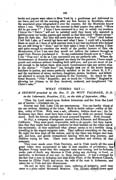
[p. 166]
WHAT OTHERS SAY:—
A SERMON preached by the Rev. T. De WITT TALMAGE, D. D. in the Tabernacle, Brooklyn, U.S., on the 26th of September, 1880.
'Then the Lord rained upon Sodom brimstone and fire from the Lord out of heaven.'—GENESIS xix. 24.
SODOM and Salt Lake City are synonymous. You can hardly think of the one without thinking of the other. Both in fertile valleys—valley of Siddim, valley of Utah. Both near a salt, offensive, fishless dead sea; for Dr. Robinson says there must have been a lake near by while yet ancient Sodom stood. Both the famous capitals of most accursed Impurity. Both doomed.
In 1857, a company of emigrants started from Arkansas and Missouri for California. They were good, respectable, well-to-do people; but they had an idea that they might have larger comforts for their families on the other side of the mountains; so they undertook what always seems to be a terrible thing, travelling in the wagon emigrant train. They suffered everything on the way. By night the fires kept off the wolves, and by day there was fatigue and hunger, and heat, and gentle womanhood fainting with the long journey, and children crying for rest. There were one hundred and seventy in that company.
They must needs cross Utah Territory, and in Utah nearly all the emigrant trains were accustomed to take in new supplies of provisions; but Brigham Young heard that this emigrant train was coming, and he forbade, under pain of death, any Mormon in Utah giving any clothing, or food, or medicine, or kindness of any sort, to these emigrants. It was a revenge for the fact that a man in Arkansas had slain Elder Pratt, of the Mormon Church, because he (Elder Pratt) had stolen the wife of the man in Arkansas, and taken her to Utah and into Mormonism.
On and on went this emigrant train, suffering all indignity, until they came to a plain called Mountain Meadow. The Indians dashed down upon
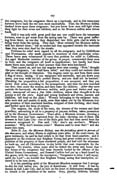
[p. 167]
the emigrants, but the emigrants threw up a barricade, and in this temporary fortress drove back the red men most successfully. Then the Mormon militia dashed down upon these emigrants; but you know how men will fight when they fight for their wives and children, and so the Mormon militia were driven back.
Still it was only with great peril that any one could leave the temporary fortress, even to get water from the spring near by. There was great suffering from thirst, so one day they dispatched two little girls clad in white to bring water from the spring. They said, 'Most certainly the Mormon militia will not disturb them;' but no sooner had they appeared outside the barricade than they were shot dead by the stream.
Petitions for relief were signed by all the emigrants, and by Oddfellows and Freemasons, who made appeals to members of their particular order. Three brave men volunteered to carry that petition for relief to California. An aged Methodist minister of the group, in prayer, commended these men to God, and the emigrants all knelt in supplication; but hardly had these three brave men started on their journey than they were butchered.
Time passed on, and one day wagons were seen coming. 'Now,' thought the poor emigrants, 'we shall have relief,' and they could not restrain their glee at the thought of liberation. The wagons came up, and from them came a flag of truce, saying, 'If you emigrants will surrender, and put down your arms, you may walk out into perfect liberty, and you shall not be harmed.' Thinking the proposition a fair proposition, it was accepted, and they put down their arms, according to the arrangement, and then the men marched out first, then came the women, and then came the children. After they were outside the barricade, the Mormon militia, with guns and knives and daggers, massacred all save a few little children, whom they thought to be too young to tell the story. Aged and young husbands and wives, parents and children, left dead on the plain! Women belonging to the emigrant train, who were sick and unable to walk, were then taken out by the Mormons into the presence of their murdered families, stripped of their clothing, shot dead, and hurled upon the heap of corpses.
The wagons, the stock of the train, the dresses of the women and their jewellery, amounting in all to a property of 300,000 dollars, taken possession of by the Mormon Government. Years after, a Mormon woman, showing a silk dress that had been captured from the train—showing one of these silk dresses in Salt Lake City—one of the little girls that had been saved from the massacre recognised it. She said, 'Oh! that's my mother's. Where's mamma? Why don't mamma come? Mamma used to wear that!' and she burst into tears.
John D. Lee, the Mormon Bishop, was the prisiding spirit in person of the massacre, and when, fifteen or eighteen years after, in the court-room, he gave testimony, he said he had orders to do that from head-quarters; and it appeared on the evidence that Brigham Young had given orders as to the disposition of the property of these murdered people, and had told the witnesses to hush up, and all Christendom to-day holds that man responsible for the tragedy. No wonder, when years after he visited the scene and found that the bones of the emigrants had been decently buried by the officers of the United States Government, and General Carlton had put up a head-board by the grave, with the epitaph, the inscription, 'Vengeance is mine, I will repay, saith the Lord'— no wonder that Brigham Young, seeing that inscription, ordered it to be torn down.
It is the presiding spirit of the Mountain Meadow massacre that I arraign to-day for trial before you, the jury of Americans. It still lives. It has its throne in Salt Lake City, and its foot on the heart of dishonoured women, and its breath is the pestilence of the nation. Gory, ghastly, hideous, infernal
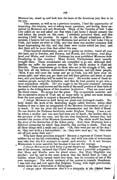
[p. 168]
Mormonism, stand up and look into the faces of the American jury that is to try you.
This summer, as well as on a previous occasion, I had the opportunity of inspecting this iniquity, and of asking many questions, and having them answered by Mormons and anti-Mormons. Many of the Gentiles of Salt Lake City called on me and asked me that when I got home I should present the case before the people on this coast. I solemnly promised them, and this morning I fulfil my promise. In regard to the alleged subsidence of Mormonism, I have to tell you that 750 Mormons had arrived in Salt Lake City of Utah, just before we went to Utah, and that there was another company stilllIarger approaching the city, and that there were 10,000 added last year, and that there will be more than that added this year.
Three hundred missionaries, sent out to gather up victims, travel all over this land, and in Sweden, and Norway, and Russia, and Germany, and England, and Wales, and Scotland. (Germany has now prohibited Mormons from Proselyting in that country.) Many Scotch Presbyterians were recently brought there. These missionaries are compelled to go out, although their families my suffer the greatest penury, for this whole system is cruel and Herodic. These missionaries go to those who are in the struggle of life, and they hide all the hideous deformities of Mormonism, and tell these people, 'Now, if you will cross the ocean and go to Utah, you will have your expenses paid; and when you get there you will have gardens and farms of your own, and your hardships will be ended for ever.' No wonder some of these in-cautious people accept the invitation, and then fly from poverty to get into a most stupendous swindle. Oh! you ought to see the poor creatures carrying the tenth of their small income and the tenth of the small product of their farm or garden to the tithing-house of this insatiate institution. They are taxed until the blood comes. No escape but the grave. The co-operative societies and the co-operative stores of Utah are so many mills to grind out more money from the poor people to support a depraved priesthood.
I charge Mormonism with being one great and prolonged cruelty. No-body denies the work of the destroying angels called Danites, whose chief business it was to hunt up antagonism to the Mormon Government and put it to death. It was for years the land of assassination and the field of blood. No one doubts the Hickman butcheries under Brigham Young. I saw a cellar where a mother and two sons had been put to death, the mother slain in the presence of the two sons, and the two sons butchered, because they had revealed the secrets of the Mormon Government. The whole world has heard the story of the destruction of the Aiken party. And these Mormons have a delicious vernacular by which they describe this putting to death. They say all these things with a smile and a jeer. 'Oh, they were put out of the way;' or, 'they met with a a bad accident;' or, 'they were used up;' or, 'they were cut off just under their ears! '
Why have these atrocities stopped? Because a regiment of United States soldiers are on the hill overlooking the city, and with iron rake of destruction may rake that city if it attempts to repeat such atrocity. It is not because Mormonism is more merciful, but because it has not the courage.
I charge Mormonism with being a great blasphemy. Brigham Young in one of his sermons, declared that Christ himself was a practical polygamist; that Mary and Martha were his plural wives; that Mary Magdalen was another; and he said in the same sermon that the bridal feast in Cana of Galilee, where Christ turned water into wine, was the occasion of one of His own marriages! The whole tendency of the system is towards blasphemy. It was told over and over again that Brigham Young, with slight provocation, would swear like a fishwoman at Billingsgate.
I charge upon Mormonism that it is a disloyalty to the United States
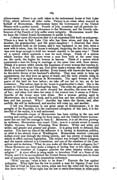
[p. 169]
Government. There is an oath taken in the endowment house at Salt Lake City, which subverts all other oaths. Perjury is no crime when enacted in behalf of Mormonism. Mormonism hates the Government of the United States with a perfect hatred. Fourth of July occasions and all patriotic demonstrations are an utter abhorrence to the Mormons, and the Gentile celebrators of the Fourth of July suffer every indignity. Mormonism would like to have the United States Government to perish to-day.
I charge upon Mormonism that it is an organised filth built on polygamy. There is a man in Salt Lake City who has three wives, and they are the mother, the grandmother, and the grand-daughter! I observed that there were additions built on the houses, and it was explained to me that, when a new wife is taken, then the house is enlarged, forgetting the fact that no house was ever large enough to hold two women married to the same man! Think of a system which applauds a man for such things. Think of a system which teaches that the more wives a man lives with at the same time on the earth, the higher his honour in heaven. Think of a system which commends a man for living in marriage at the same time with three sisters. Think of a system which wrecks the happiness of every woman that touches it, for, I do not care what they say, God never made a woman who can cheerfully divide a husband's love with another. Every honest wife knows she has a right to the entire throne of her husband's affection. They may smile to keep up appearances, but they have an agony of death, and the most pitiable thing in all the earth is an aged woman in Mormonism. The aged woman in other parts of the land we bow before; we take off our hat to her, we do her reverence. The softest chair in the house is grandmother's chair. She is the queen on Christmas and Thanksgiving days. The older she gets, and the more wrinkles on her face, and the more stooped her shoulder, the more we think of her; and when God takes her away to the eternal rest, it seems as if three-fourths of the house were torn down. But a woman getting aged in Mormonism, she is shoved back, and is paid less and less attention, and is of less and less account. Why? Another has taken the throne, and, after awhile, she will be dethroned, and another will come up, and another.
I tell you Mormonism is one great surge of licentiousness; it is the seraglio of the Republic, it is the concentred corruption of this land, it is the brothel of the nation, it is hell enthroned.
This miserable corpse of Mormonism has been rotting in the sun, and rotting and rotting and rotting for forty years, and the United States Government has not had the courage to bury it. Moreover, it is all the time gaining in influence. Mormonism once meant Utah; now to a certain extent it means Idaho, Arizona, Nevada, Wyoming, New Mexico. Wider and wider and wider, and greater and greater and greater. It is going forth to debauch this nation. You have no idea of the influence it is having in American politics, or what it has already done at Washington. Mormonism receives 1,000,000 dollars every year through the tithing system, and has plenty of money with which to effect national legislation. The subject was brought before Congress and the matter referred to a Committee, and one of the members of the Committee said in derision, 'What do you make all this fuss about polygamy for? Those Mormons out there make a religion of having four or five wives, while some of us members of Congress practise the same iniquity without any religion!' A stout effort is being made to introduce Utah as a State of the Union, and if it be accomplished the United States Government puts its broad seal of approbation upon this stupeudous indecency.
'Now,' you say, "what is best to be done?' Execute the law against polygamy. What right has the law to punish a man for bigamy, if one foot this side of Utah he have two wives, when one foot the other side the law lets him have twenty ? What right has the law to smite libertinism in other parts
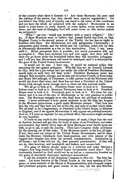
[p. 170]
of this country when there it licenses it? Are these Mormons the pets am the darlings of the nation, that they should have especial regulations? Do you believe that filthy pool of iniquity can stand in the midst of this continent and not have the whole air poisoned with the malaria? Mormonism is at insult to every home, to every church, to every father, every mother, ever sister, and the curse of Almighty God will come down on this nation unless we extirpate it.
'What!' say you, 'would you interfere with a man's religion?' Oh no. If these Mormons want to believe that Joseph Smith was God, or that Brigham Young is the second person of the Trinity, the law has no right to interfere with them. But Mormonism not only antagonises Christianity; it antagonises good morals, and the infidel and the Christian stand side by side in denouncing Mormonism as a foe to free institutions. Then, I say, away with it! Moral persuasion first, if possible; but moral persuasion will not accomplish it. They have declared, over and over again, that they will let their city go down under the bombshell before they will surrender polygamy, and I tell you that Mormonism will never be destroyed until it is destroyed by the guns of the United States Government.
It would not be war. I hate war. It would be national police duly executing the law against polygamy. Why did they not let General Johnson in 1857, with his 2,500 troops sent out under the order of President Buchanan, march right on until they did their work? President Buchanan never was charged with excessive courage, and he sent out Governor Powell, of Kentucky, and Major McCullough, of Tennessee, to offer pardon to all the Mormons who would put down their arms, and there has not been a President of the United States with enough moral courage since to clean out that national stable.
We all go to look at it. President Grant went to look at it. Secretary Schurz went to look at it. Secretary Thompson went to look at it. President Hayes went to look at it. Everybody goes to look at it. We cross the continent, and it is one of the arts of Mormonism to be very gracious to public men. The Mormons struggle as to who shall have the privilege of entertainment. I never addressed a more genial audience in my life than last August in the Mormon opera-house, a great many Mormons present. They bow you into the city, and they bow you out of the city, and none of us dare touch them. We all want to be Congressmen, or President of the United States, or Minister to England, and if we oppose Mormonism it will oppose or political interests. And so, if I were an aspirant for any political office, this sermon might perhaps be very impolitic.
If there be any truth in the transmigration of souls, I hope that the soul of Andrew Jackson will get into the body of some of our Presidents, and make proclamation that within thirty days all these Mormons must decide upon one wife, or go to jail, or quit the country. Then have Congress make provisions for the carrying out of this order. If the Mormons submit to the law, all right. If not, then send out troops of the United States Government, and let them make the Mormon Tabernacle their head-quarters, and with cannon of the biggest bore thunder into them the seventh commandment. Arbitration by all means; but if that will not do, then peaceful proclamation. If that will not do, then howitzer, and bombshell, and bullets, and cannon-ball.
If a gang of thieves should squat on a territory and make thievery a religion, how long would the United States Government stand that? Yet a community founded on theft would not be so bad as a community founded on the grave of desolated, destroyed, embruited womanhood.
I call the attention of the American Congress to this evil. The hour has come. Let some Senator of the United States at the next meeting of Congress, or some member of the House of Representatives, with eloquent tongue and persistent purpose, and good morals of his own, lift the anti-Mormon
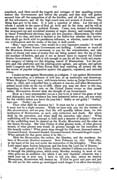
[p. 171]
standard, and then unroll the tragedy and outrages of that appalling system before the Government and before the people, and that man will gather around him all the sympathies of all the families, and all the Churches, and all the reformers, and all the high-toned men and women of America. The thing has got to be done. It is only a question of when. Let this man of whom I speak in the name of God go forth and do his duty, and he will at the same time make his political fortune. Come, now, instead of exhuming the wrapped-up and entombed mummy of negro slavery, and tossing it about in these Presidential elections, have one live question—Mormonism, the white slavery of to-day, and have it decided at the ballot-box whether that institution shall go forth with its pestiferous influence, or whether, under the law of our civilization and the stroke of the law, it shall perish.
'But,' says some one, 'that would be a very expensive crusade.' It would not cost the United States Government one farthing. Confiscate so much of the Mormon domain as is necesaary to pay for the extermination, and take some of those vast sums of money that are being poured into the lap of that old mother of harlots, and pay it out as honest taxes to support the United States Government. Utah is rich enough to pay for all the costly and expensive surgery of taking out this dripping cancer of Mormonism. Let the pulpits and the platforms and the printing-press agitate, and agitate, and agitate until Congress and the White House shall hear rumbling all around the sky the storm of popular indignation against this gigantic, organized, and national crime.
I make no war against Mormonism as a religion. I war against Mormonism as an immorality, as a defiance of civil law, as an institution anti-American. When Brigham Young's men, with bowie-knives, broke up Judge Drummond's court in 1856, and compelled him to adjourn it sine die, and when Mormonism poised loose rocks on the top of cliffs, where you may see them to this day, expecting to throw them over on the United States troops as they passed under, Mormonism showed what she thought of our Government.
Now as I have empannelled you as a jury to sit in trial of this giant of lust and disloyalty, and the evidence has been presented before you, are you ready for the verdict before you leave the jury-box? Guilty or not guilty? 'Guilty,' says one. 'Guilty,' say all.
Then what shall the sentence be? It must not be a small incarceration, it must not be a slight censure. While we have only pity for the victims of this abomination, and we pray God He will speedily deliver them, for this institution of Mormonism, as such, only extinction and death. But where shall be the execution, and when shall the execution take place? What scaffolding will be strong enough to hold such a monster of iniquity? One end of the scaffolding must be planted on the Rocky Mountains and the other on the Sierra Nevadas. But what Friday of what gloomy week, of what gloomy month, of what gloomy year would be gloomy enough for the execution of this beastly outlaw? What grave deep enough for this stout, thousand-armed, thousand-footed, thousand-headed, thousand-horned, thousand-fanged corpse? What epitaph for that grave unless it be this:
Here lies Mormonism, the outlaw, the libertine, and the murderer, the hero of Mountain Meadow massacre. Born February 22, 1827. Died 1882, at the hand of the law and under the instruction of the Almighty. 'Then the Lord rained upon Sodom brimstone and fire from the Lord out of Heaven.'
Oh! good people of the United States, whether I address you face to face or through the printing-press, which every Monday morning in most of our cities gives me an audience—for which I am very thankful—whatever way I reach your ear or your eye, I have to tell you that, unless we destroy Mormonism, Mormonism will destroy us. If God be good and pure and just He will not let this nation go unwhipped much longer if we allow that iniquity
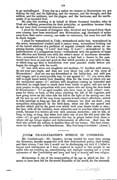
[p. 172]
to go unchallenged. Every day as a nation we consent to Mormonism we are defying the hail, and the lightning, and the trumpet, and the drought, and the mildew, and the epidemic, and the plague, and the hurricane, and the earth-quake of an incensed God.
My plea this morning is in behalf of fifteen thousand Gentiles, who in Utah are suffering persecution for their principles, or speechless because they do not want their commercial interests sacrificed.
I plead for thousands of foreigners who, deceived and betrayed from their own country, have been introduced into Mormonism, anal thousands of miles away from their native country, can make no resistance, but must live and die in dumb despair.
I plead for womanhood in Utah—womanhood under foot, womanhood in the sewer, womanhood crushed until it cannot weep, womanhood looking out of the barred windows of a perdition of anguish towards what seems an unpitying heaven, crying, 'O Lord! how long, O Lord!'—womanhood in the pandemonium of a polygamous home—womanhood with the garlands of hope and affection and honour torn with the swine's snout of incestuous abomination—womanhood that, if it had a chance, or had had a chance in the past, would have been as pure and good as that which presides at your table to-day, or which long ago bent in benediction over your peaceful cradle before you began the struggle with the world.
O! men with wives and daughters and mothers; O! brothers with sisters, do not your ears tingle, and does not your blood run cold at this story of Mormonism? And are you not determined at the ballot-box, and with pen and tongue, and in every possible way, to war against it? O! you wives, who will to-night kneel before God, thanking Him for the home in which you are the undisputed queen—O! mothers with daughters coming up honoured and defended, no rough hand to touch them from cradle to grave, will you not in your prayers to-day sympathise with your sisters who are dying the slow death of Mormonism? O! ye aged couples, who have been in each other's company for thirty, or forty, or fifty years, climbing the hill of life together, and now going down on the other side the hill in the light of the setting sun; but all the way up and all the way down supreme in each other's affections; united in holy marriage so long ago that all the witnesses but God are dead; your sympathies strengthened by the birth-hour, when one life was spared and another added, and by the grave over which both your hearts broke at once; her face, with all the wrinkles, more attractive now to you than when rosy with youth, because it is written all over with precious memories; side by side, so long, so long, so long, that when God takes one of you He will soon take the other—O! ye aged couple, remember this day, in prayer before God, those to whom old age brings neglect and dethronement of affection. And may the God who setteth the solitary in families bless all our homes. The best corner-stone for the republic is the hearthstone. May God keep it inviolate! (Amen.')